Commander Synergies
Discover cards that synergize perfectly with your Commander.
Synergy
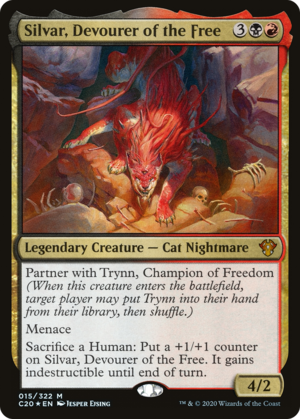
Card Details
Info
| Color: | |
| Identifies: | |
| Cost: |
|
| Rarity: | Mythic |
| Converted Cost: | 5 |
| Power/Toughness: | 4/2 |
| Types: | |
| SubTypes: | |
| Languages: | 
       |
| Layout: | Normal |
| Rank: | |
| Saltiness: |
Abilities/Keywords
Rules
Prices
Legalities
Standard
Standardbrawl
Vintage
Modern
Brawl
Historic
Duel
Alchemy
Predh
Oathbreaker
Commander
Pioneer
Oldschool
Timeless
Premodern
Penny
Pauper
Gladiator
Paupercommander
Future
Legacy
Text
Partner with Trynn, Champion of Freedom (When this creature enters, target player may put Trynn into their hand from their library, thenshuffle) Menace Sacrifice a Human: Put a +1/+1counteron Silvar. It gains indestructible until end of turn.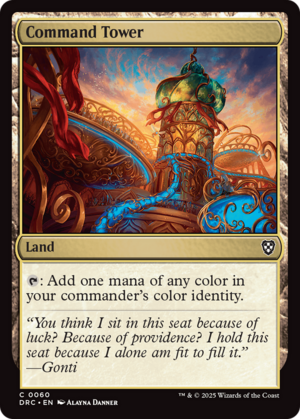
Card Details
Info
| Color: | |
| Identifies: | |
| Cost: | |
| Rarity: | Common |
| Converted Cost: | 0 |
| Power/Toughness: | / |
| Types: | |
| SubTypes: | |
| Languages: | 
          |
| Layout: | Normal |
| Rank: | |
| Saltiness: |
Rules
Text
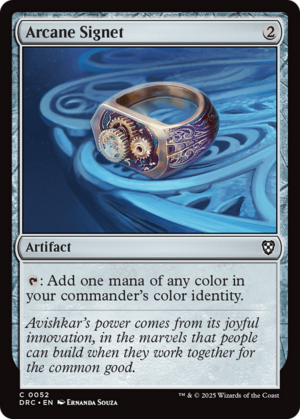
Card Details
Info
| Color: | |
| Identifies: | |
| Cost: |
|
| Rarity: | Common |
| Converted Cost: | 2 |
| Power/Toughness: | / |
| Types: | |
| SubTypes: | |
| Languages: | 
          |
| Layout: | Normal |
| Rank: | |
| Saltiness: |
Rules
Text
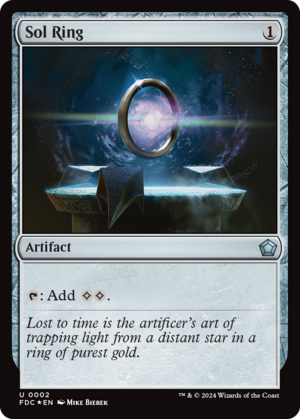
Card Details
Info
| Color: | |
| Identifies: | |
| Cost: |
|
| Rarity: | Uncommon |
| Converted Cost: | 1 |
| Power/Toughness: | / |
| Types: | |
| SubTypes: | |
| Languages: | 
         |
| Layout: | Normal |
| Rank: | |
| Saltiness: |
Rules
Text
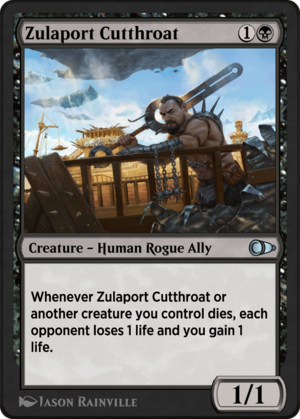
Card Details
Info
| Color: | |
| Identifies: | |
| Cost: |
|
| Rarity: | Uncommon |
| Converted Cost: | 2 |
| Power/Toughness: | 1/1 |
| Types: | |
| SubTypes: | |
| Languages: | 
          |
| Layout: | Normal |
| Rank: | |
| Saltiness: |
Rules
Prices
| Seller | Price |
|---|
Legalities
Standard
Standardbrawl
Vintage
Modern
Brawl
Historic
Duel
Alchemy
Predh
Oathbreaker
Commander
Pioneer
Oldschool
Timeless
Premodern
Penny
Pauper
Gladiator
Paupercommander
Future
Legacy
Text
Whenever this creature or another creature you control dies, each opponent loses 1 life and you gain 1 life.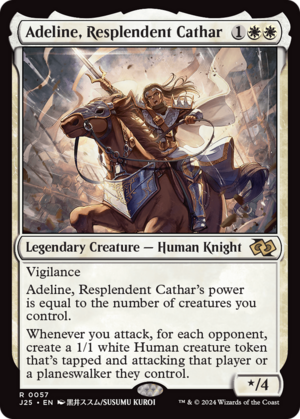
Card Details
Info
| Color: | |
| Identifies: | |
| Cost: |
|
| Rarity: | Rare |
| Converted Cost: | 3 |
| Power/Toughness: | */4 |
| Types: | |
| SubTypes: | |
| Languages: | 
          |
| Layout: | Normal |
| Rank: | |
| Saltiness: | |
| Tokens: |
Abilities/Keywords
Rules
Text
Vigilance Adeline's power is equal to the number of creatures you control. Whenever you attack, for each opponent, create a 1/1 white Human creature token that's tapped and attacking that player or a planeswalker they control.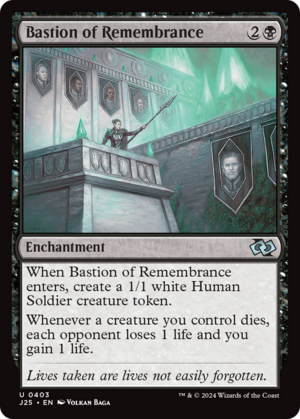
Card Details
Info
| Color: | |
| Identifies: | |
| Cost: |
|
| Rarity: | Uncommon |
| Converted Cost: | 3 |
| Power/Toughness: | / |
| Types: | |
| SubTypes: | |
| Languages: | 
          |
| Layout: | Normal |
| Rank: | |
| Saltiness: | |
| Tokens: |
Rules
Text
When this enchantment enters, create a 1/1 white Human Soldier creature token. Whenever a creature you control dies, each opponent loses 1 life and you gain 1 life.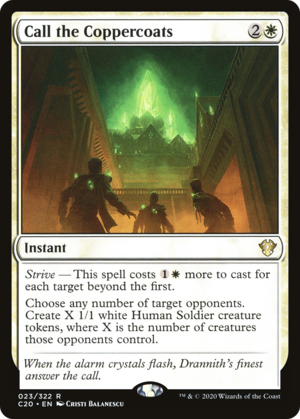
Card Details
Info
| Color: | |
| Identifies: | |
| Cost: |
|
| Rarity: | Rare |
| Converted Cost: | 3 |
| Power/Toughness: | / |
| Types: | |
| SubTypes: | |
| Languages: | 
         |
| Layout: | Normal |
| Rank: | |
| Saltiness: | |
| Tokens: |
Abilities/Keywords
Rules
Prices
Legalities
Standard
Standardbrawl
Vintage
Modern
Brawl
Historic
Duel
Alchemy
Predh
Oathbreaker
Commander
Pioneer
Oldschool
Timeless
Premodern
Penny
Pauper
Gladiator
Paupercommander
Future
Legacy
Text
Strive — This spell costs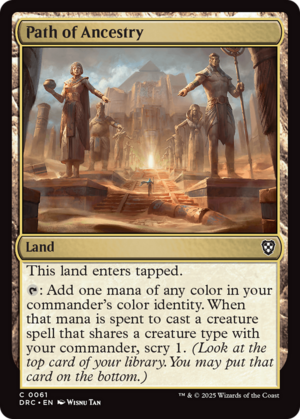
Card Details
Info
| Color: | |
| Identifies: | |
| Cost: | |
| Rarity: | Common |
| Converted Cost: | 0 |
| Power/Toughness: | / |
| Types: | |
| SubTypes: | |
| Languages: | 
         |
| Layout: | Normal |
| Rank: | |
| Saltiness: |
Abilities/Keywords
Rules
Text
This land enters tapped.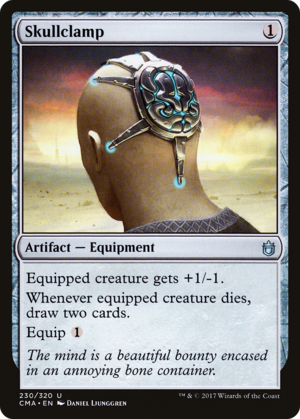
Card Details
Info
| Color: | |
| Identifies: | |
| Cost: |
|
| Rarity: | Uncommon |
| Converted Cost: | 1 |
| Power/Toughness: | / |
| Types: | |
| SubTypes: | |
| Languages: | 
         |
| Layout: | Normal |
| Rank: | |
| Saltiness: |
Abilities/Keywords
Rules
Prices
Legalities
Standard
Standardbrawl
Vintage
Modern
Brawl
Historic
Duel
Alchemy
Predh
Oathbreaker
Commander
Pioneer
Oldschool
Timeless
Premodern
Penny
Pauper
Gladiator
Paupercommander
Future
Legacy
Text
Equipped creature gets +1/-1. Whenever equipped creature dies, draw two cards. Equip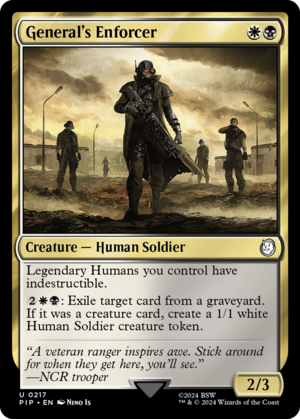
Card Details
Info
| Color: | |
| Identifies: | |
| Cost: |
|
| Rarity: | Uncommon |
| Converted Cost: | 2 |
| Power/Toughness: | 2/3 |
| Types: | |
| SubTypes: | |
| Languages: | 
          |
| Layout: | Normal |
| Rank: | |
| Saltiness: | |
| Tokens: |
Rules
Prices
Legalities
Standard
Standardbrawl
Vintage
Modern
Brawl
Historic
Duel
Alchemy
Predh
Oathbreaker
Commander
Pioneer
Oldschool
Timeless
Premodern
Penny
Pauper
Gladiator
Paupercommander
Future
Legacy
Text
Legendary Humans you control have indestructible.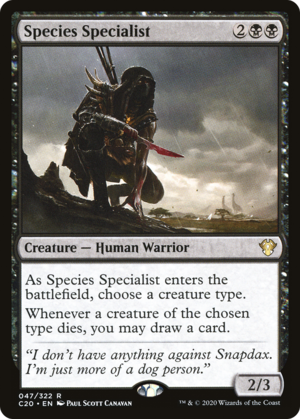
Card Details
Info
| Color: | |
| Identifies: | |
| Cost: |
|
| Rarity: | Rare |
| Converted Cost: | 4 |
| Power/Toughness: | 2/3 |
| Types: | |
| SubTypes: | |
| Languages: | 
       |
| Layout: | Normal |
| Rank: | |
| Saltiness: |
Rules
Prices
Legalities
Standard
Standardbrawl
Vintage
Modern
Brawl
Historic
Duel
Alchemy
Predh
Oathbreaker
Commander
Pioneer
Oldschool
Timeless
Premodern
Penny
Pauper
Gladiator
Paupercommander
Future
Legacy
Text
As this creature enters, choose a creature type. Whenever a creature of the chosen type dies, you may draw a card.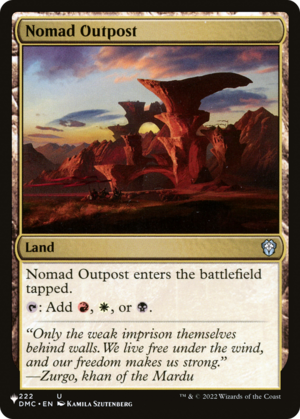
Card Details
Info
| Color: | |
| Identifies: | |
| Cost: | |
| Rarity: | Uncommon |
| Converted Cost: | 0 |
| Power/Toughness: | / |
| Types: | |
| SubTypes: | |
| Languages: | 
        |
| Layout: | Normal |
| Rank: | |
| Saltiness: |
Rules
Text
This land enters tapped.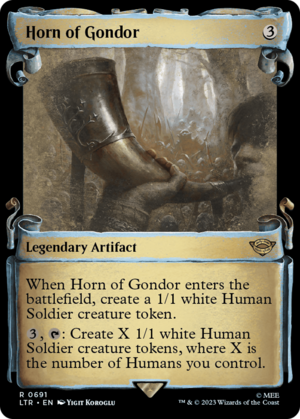
Card Details
Info
| Color: | |
| Identifies: | |
| Cost: |
|
| Rarity: | Rare |
| Converted Cost: | 3 |
| Power/Toughness: | / |
| Types: | |
| SubTypes: | |
| Languages: | 
       |
| Layout: | Normal |
| Rank: | |
| Saltiness: | |
| Tokens: |
Rules
Prices
Legalities
Standard
Standardbrawl
Vintage
Modern
Brawl
Historic
Duel
Alchemy
Predh
Oathbreaker
Commander
Pioneer
Oldschool
Timeless
Premodern
Penny
Pauper
Gladiator
Paupercommander
Future
Legacy
Text
When Horn of Gondor enters, create a 1/1 white Human Soldier creature token.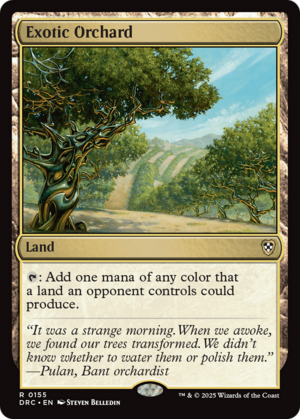
Card Details
Info
| Color: | |
| Identifies: | |
| Cost: | |
| Rarity: | Rare |
| Converted Cost: | 0 |
| Power/Toughness: | / |
| Types: | |
| SubTypes: | |
| Languages: | 
         |
| Layout: | Normal |
| Rank: | |
| Saltiness: |
Rules
Text
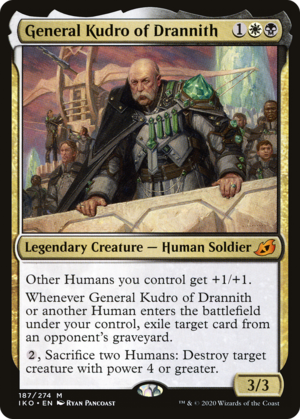
Card Details
Info
| Color: | |
| Identifies: | |
| Cost: |
|
| Rarity: | Mythic |
| Converted Cost: | 3 |
| Power/Toughness: | 3/3 |
| Types: | |
| SubTypes: | |
| Languages: | 
          |
| Layout: | Normal |
| Rank: | |
| Saltiness: |
Rules
Prices
Legalities
Standard
Standardbrawl
Vintage
Modern
Brawl
Historic
Duel
Alchemy
Predh
Oathbreaker
Commander
Pioneer
Oldschool
Timeless
Premodern
Penny
Pauper
Gladiator
Paupercommander
Future
Legacy
Text
Other Humans you control get +1/+1. Whenever General Kudro or another Human you control enters, exile target card from an opponent's graveyard.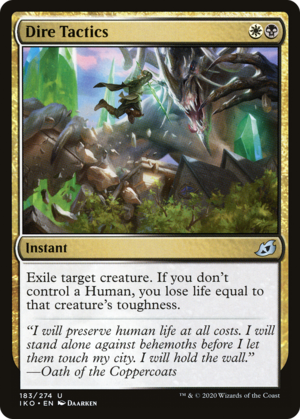
Card Details
Info
| Color: | |
| Identifies: | |
| Cost: |
|
| Rarity: | Uncommon |
| Converted Cost: | 2 |
| Power/Toughness: | / |
| Types: | |
| SubTypes: | |
| Languages: | 
          |
| Layout: | Normal |
| Rank: | |
| Saltiness: |
Rules
Prices
Legalities
Standard
Standardbrawl
Vintage
Modern
Brawl
Historic
Duel
Alchemy
Predh
Oathbreaker
Commander
Pioneer
Oldschool
Timeless
Premodern
Penny
Pauper
Gladiator
Paupercommander
Future
Legacy
Text
Exile target creature. If you don't control a Human, you lose life equal to that creature's toughness.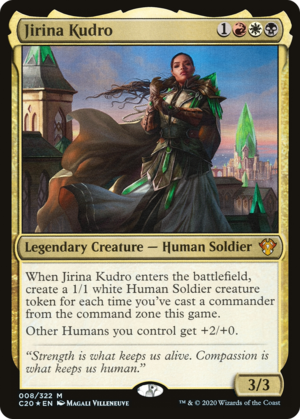
Card Details
Info
| Color: | |
| Identifies: | |
| Cost: |
|
| Rarity: | Mythic |
| Converted Cost: | 4 |
| Power/Toughness: | 3/3 |
| Types: | |
| SubTypes: | |
| Languages: | 
       |
| Layout: | Normal |
| Rank: | |
| Saltiness: | |
| Tokens: |
Rules
Prices
Legalities
Standard
Standardbrawl
Vintage
Modern
Brawl
Historic
Duel
Alchemy
Predh
Oathbreaker
Commander
Pioneer
Oldschool
Timeless
Premodern
Penny
Pauper
Gladiator
Paupercommander
Future
Legacy
Text
When Jirina Kudro enters, create a 1/1 white Human Soldier creature token for each time you've cast a commander from the command zone this game. Other Humans you control get +2/+0.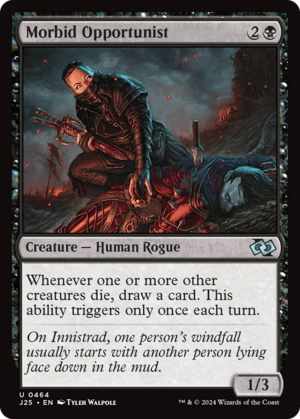
Card Details
Info
| Color: | |
| Identifies: | |
| Cost: |
|
| Rarity: | Uncommon |
| Converted Cost: | 3 |
| Power/Toughness: | 1/3 |
| Types: | |
| SubTypes: | |
| Languages: | 
          |
| Layout: | Normal |
| Rank: | |
| Saltiness: |
Rules
Text
Whenever one or more other creatures die, draw a card. This ability triggers only once each turn.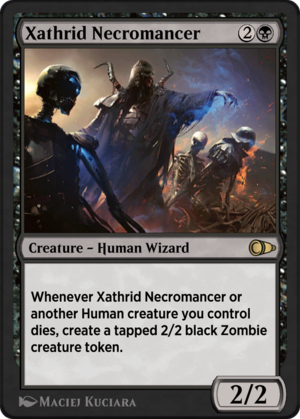
Card Details
Info
| Color: | |
| Identifies: | |
| Cost: |
|
| Rarity: | Rare |
| Converted Cost: | 3 |
| Power/Toughness: | 2/2 |
| Types: | |
| SubTypes: | |
| Languages: | 
          |
| Layout: | Normal |
| Rank: | |
| Saltiness: | |
| Tokens: |
Rules
Prices
| Seller | Price |
|---|
Legalities
Standard
Standardbrawl
Vintage
Modern
Brawl
Historic
Duel
Alchemy
Predh
Oathbreaker
Commander
Pioneer
Oldschool
Timeless
Premodern
Penny
Pauper
Gladiator
Paupercommander
Future
Legacy
Text
Whenever this creature or another Human creature you control dies, create a tapped 2/2 black Zombie creature token.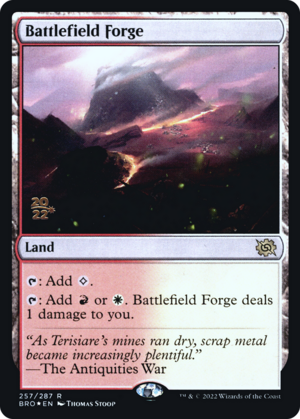
Card Details
Info
| Color: | |
| Identifies: | |
| Cost: | |
| Rarity: | Rare |
| Converted Cost: | 0 |
| Power/Toughness: | / |
| Types: | |
| SubTypes: | |
| Languages: | 
          |
| Layout: | Normal |
| Rank: | |
| Saltiness: |
Rules
Text
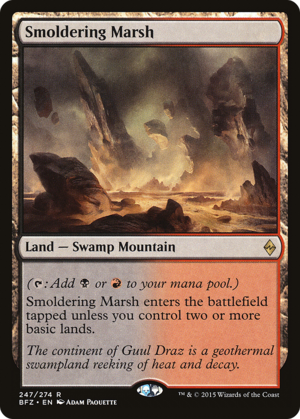
Card Details
Info
| Color: | |
| Identifies: | |
| Cost: | |
| Rarity: | Rare |
| Converted Cost: | 0 |
| Power/Toughness: | / |
| Types: | |
| SubTypes: | |
| Languages: | 
          |
| Layout: | Normal |
| Rank: | |
| Saltiness: |
Rules
Prices
Legalities
Standard
Standardbrawl
Vintage
Modern
Brawl
Historic
Duel
Alchemy
Predh
Oathbreaker
Commander
Pioneer
Oldschool
Timeless
Premodern
Penny
Pauper
Gladiator
Paupercommander
Future
Legacy
Text
(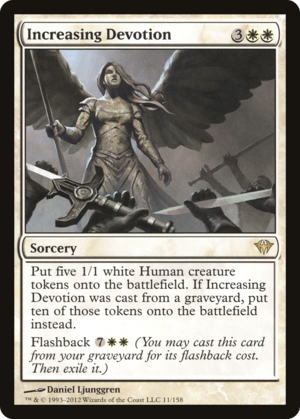
Card Details
Info
| Color: | |
| Identifies: | |
| Cost: |
|
| Rarity: | Rare |
| Converted Cost: | 5 |
| Power/Toughness: | / |
| Types: | |
| SubTypes: | |
| Languages: | 
          |
| Layout: | Normal |
| Rank: | |
| Saltiness: | |
| Tokens: |
Abilities/Keywords
Rules
Prices
Legalities
Standard
Standardbrawl
Vintage
Modern
Brawl
Historic
Duel
Alchemy
Predh
Oathbreaker
Commander
Pioneer
Oldschool
Timeless
Premodern
Penny
Pauper
Gladiator
Paupercommander
Future
Legacy
Text
Create five 1/1 white Human creature tokens. If this spell was cast from a graveyard, create ten of those tokens instead. Flashback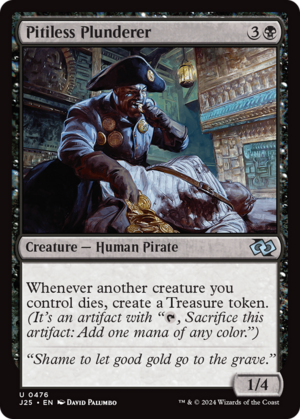
Card Details
Info
| Color: | |
| Identifies: | |
| Cost: |
|
| Rarity: | Uncommon |
| Converted Cost: | 4 |
| Power/Toughness: | 1/4 |
| Types: | |
| SubTypes: | |
| Languages: | 
          |
| Layout: | Normal |
| Rank: | |
| Saltiness: | |
| Tokens: |
Abilities/Keywords
Rules
Text
Whenever another creature you control dies, create a Treasure token. (It's an artifact with "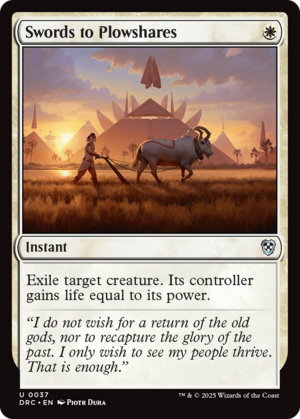
Card Details
Info
| Color: | |
| Identifies: | |
| Cost: |
|
| Rarity: | Uncommon |
| Converted Cost: | 1 |
| Power/Toughness: | / |
| Types: | |
| SubTypes: | |
| Languages: | 
         |
| Layout: | Normal |
| Rank: | |
| Saltiness: |
Rules
Prices
Legalities
Standard
Standardbrawl
Vintage
Modern
Brawl
Historic
Duel
Alchemy
Predh
Oathbreaker
Commander
Pioneer
Oldschool
Timeless
Premodern
Penny
Pauper
Gladiator
Paupercommander
Future
Legacy
Text
Exile target creature. Its controller gains life equal to its power.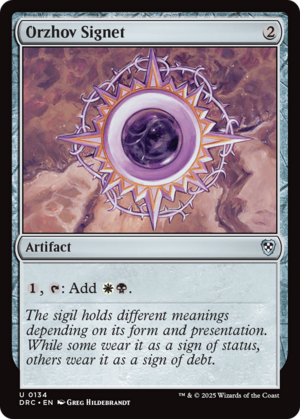
Card Details
Info
| Color: | |
| Identifies: | |
| Cost: |
|
| Rarity: | Uncommon |
| Converted Cost: | 2 |
| Power/Toughness: | / |
| Types: | |
| SubTypes: | |
| Languages: | 
         |
| Layout: | Normal |
| Rank: | |
| Saltiness: |
Rules
Text
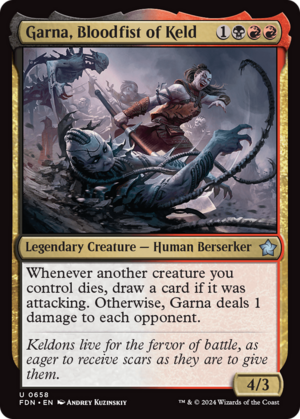
Card Details
Info
| Color: | |
| Identifies: | |
| Cost: |
|
| Rarity: | Uncommon |
| Converted Cost: | 4 |
| Power/Toughness: | 4/3 |
| Types: | |
| SubTypes: | |
| Languages: | 
       |
| Layout: | Normal |
| Rank: | |
| Saltiness: |
Rules
Text
Whenever another creature you control dies, draw a card if it was attacking. Otherwise, Garna deals 1 damage to each opponent.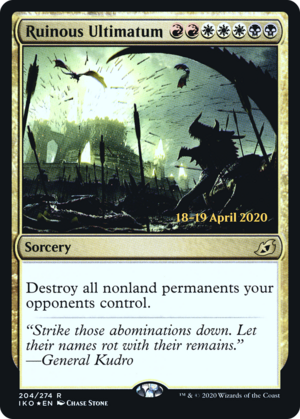
Card Details
Info
| Color: | |
| Identifies: | |
| Cost: |
|
| Rarity: | Rare |
| Converted Cost: | 7 |
| Power/Toughness: | / |
| Types: | |
| SubTypes: | |
| Languages: | 
      |
| Layout: | Normal |
| Rank: | |
| Saltiness: |
Rules
Prices
Legalities
Standard
Standardbrawl
Vintage
Modern
Brawl
Historic
Duel
Alchemy
Predh
Oathbreaker
Commander
Pioneer
Oldschool
Timeless
Premodern
Penny
Pauper
Gladiator
Paupercommander
Future
Legacy
Text
Destroy all nonland permanents your opponents control.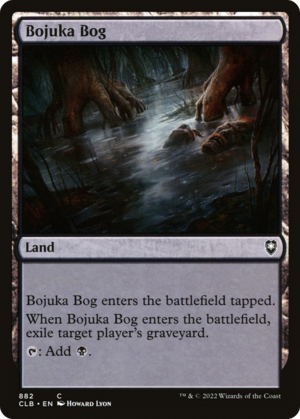
Card Details
Info
| Color: | |
| Identifies: | |
| Cost: | |
| Rarity: | Common |
| Converted Cost: | 0 |
| Power/Toughness: | / |
| Types: | |
| SubTypes: | |
| Languages: | 
         |
| Layout: | Normal |
| Rank: | |
| Saltiness: |
Rules
Prices
Legalities
Standard
Standardbrawl
Vintage
Modern
Brawl
Historic
Duel
Alchemy
Predh
Oathbreaker
Commander
Pioneer
Oldschool
Timeless
Premodern
Penny
Pauper
Gladiator
Paupercommander
Future
Legacy
Text
This land enters tapped. When this land enters, exile target player's graveyard.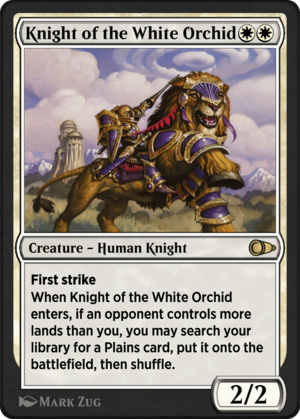
Card Details
Info
| Color: | |
| Identifies: | |
| Cost: |
|
| Rarity: | Rare |
| Converted Cost: | 2 |
| Power/Toughness: | 2/2 |
| Types: | |
| SubTypes: | |
| Languages: | 
          |
| Layout: | Normal |
| Rank: | |
| Saltiness: |
Abilities/Keywords
Rules
Prices
| Seller | Price |
|---|
Legalities
Standard
Standardbrawl
Vintage
Modern
Brawl
Historic
Duel
Alchemy
Predh
Oathbreaker
Commander
Pioneer
Oldschool
Timeless
Premodern
Penny
Pauper
Gladiator
Paupercommander
Future
Legacy
Text
First strike When this creature enters, if an opponent controls more lands than you, you may search your library for a Plains card, put it onto the battlefield, thenshuffleLess Synergy
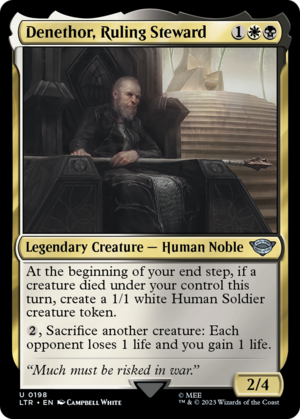
Card Details
Info
| Color: | |
| Identifies: | |
| Cost: |
|
| Rarity: | Uncommon |
| Converted Cost: | 3 |
| Power/Toughness: | 2/4 |
| Types: | |
| SubTypes: | |
| Languages: | 
       |
| Layout: | Normal |
| Rank: | |
| Saltiness: | |
| Tokens: |
Rules
Prices
Legalities
Standard
Standardbrawl
Vintage
Modern
Brawl
Historic
Duel
Alchemy
Predh
Oathbreaker
Commander
Pioneer
Oldschool
Timeless
Premodern
Penny
Pauper
Gladiator
Paupercommander
Future
Legacy
Text
At the beginning of your end step, if a creature died under your control this turn, create a 1/1 white Human Soldier creature token.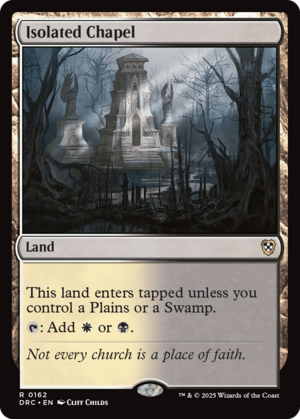
Card Details
Info
| Color: | |
| Identifies: | |
| Cost: | |
| Rarity: | Rare |
| Converted Cost: | 0 |
| Power/Toughness: | / |
| Types: | |
| SubTypes: | |
| Languages: | 
          |
| Layout: | Normal |
| Rank: | |
| Saltiness: |
Rules
Text
This land enters tapped unless you control a Plains or a Swamp.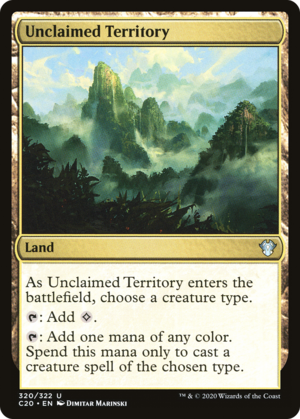
Card Details
Info
| Color: | |
| Identifies: | |
| Cost: | |
| Rarity: | Uncommon |
| Converted Cost: | 0 |
| Power/Toughness: | / |
| Types: | |
| SubTypes: | |
| Languages: | 
          |
| Layout: | Normal |
| Rank: | |
| Saltiness: |
Rules
Prices
Legalities
Standard
Standardbrawl
Vintage
Modern
Brawl
Historic
Duel
Alchemy
Predh
Oathbreaker
Commander
Pioneer
Oldschool
Timeless
Premodern
Penny
Pauper
Gladiator
Paupercommander
Future
Legacy
Text
As this land enters, choose a creature type.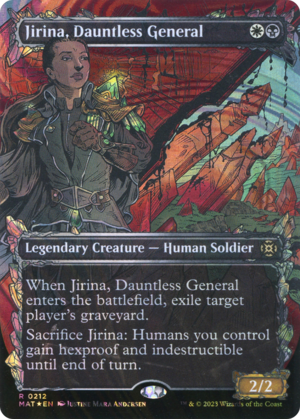
Card Details
Info
| Color: | |
| Identifies: | |
| Cost: |
|
| Rarity: | Rare |
| Converted Cost: | 2 |
| Power/Toughness: | 2/2 |
| Types: | |
| SubTypes: | |
| Languages: | 
  |
| Layout: | Normal |
| Rank: | |
| Saltiness: |
Rules
Text
When Jirina enters, exile target player's graveyard. Sacrifice Jirina: Humans you control gain hexproof and indestructible until end of turn.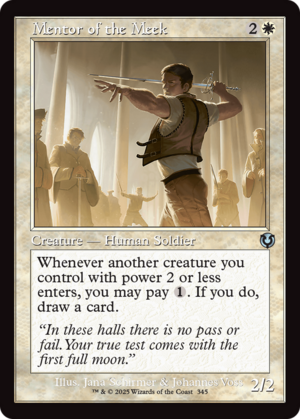
Card Details
Info
| Color: | |
| Identifies: | |
| Cost: |
|
| Rarity: | Uncommon |
| Converted Cost: | 3 |
| Power/Toughness: | 2/2 |
| Types: | |
| SubTypes: | |
| Languages: | 
          |
| Layout: | Normal |
| Rank: | |
| Saltiness: |
Rules
Prices
Legalities
Standard
Standardbrawl
Vintage
Modern
Brawl
Historic
Duel
Alchemy
Predh
Oathbreaker
Commander
Pioneer
Oldschool
Timeless
Premodern
Penny
Pauper
Gladiator
Paupercommander
Future
Legacy
Text
Whenever another creature you control with power 2 or less enters, you may pay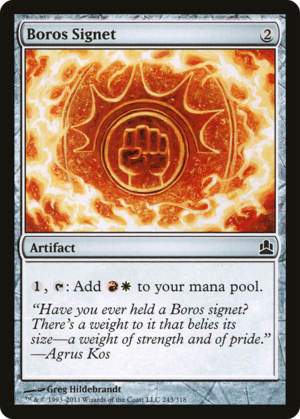
Card Details
Info
| Color: | |
| Identifies: | |
| Cost: |
|
| Rarity: | Common |
| Converted Cost: | 2 |
| Power/Toughness: | / |
| Types: | |
| SubTypes: | |
| Languages: | 
         |
| Layout: | Normal |
| Rank: | |
| Saltiness: |
Rules
Prices
Legalities
Standard
Standardbrawl
Vintage
Modern
Brawl
Historic
Duel
Alchemy
Predh
Oathbreaker
Commander
Pioneer
Oldschool
Timeless
Premodern
Penny
Pauper
Gladiator
Paupercommander
Future
Legacy
Text
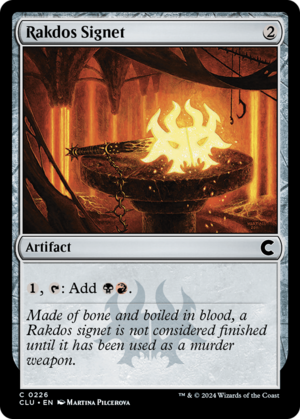
Card Details
Info
| Color: | |
| Identifies: | |
| Cost: |
|
| Rarity: | Common |
| Converted Cost: | 2 |
| Power/Toughness: | / |
| Types: | |
| SubTypes: | |
| Languages: | 
         |
| Layout: | Normal |
| Rank: | |
| Saltiness: |
Rules
Text
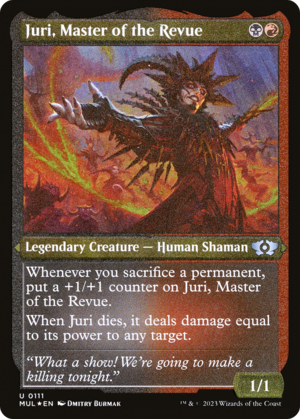
Card Details
Info
| Color: | |
| Identifies: | |
| Cost: |
|
| Rarity: | Uncommon |
| Converted Cost: | 2 |
| Power/Toughness: | 1/1 |
| Types: | |
| SubTypes: | |
| Languages: | 
        |
| Layout: | Normal |
| Rank: | |
| Saltiness: |
Rules
Prices
Legalities
Standard
Standardbrawl
Vintage
Modern
Brawl
Historic
Duel
Alchemy
Predh
Oathbreaker
Commander
Pioneer
Oldschool
Timeless
Premodern
Penny
Pauper
Gladiator
Paupercommander
Future
Legacy
Text
Whenever yousacrificea permanent, put a +1/+1counteron Juri. When Juri dies, it deals damage equal to its power to any target.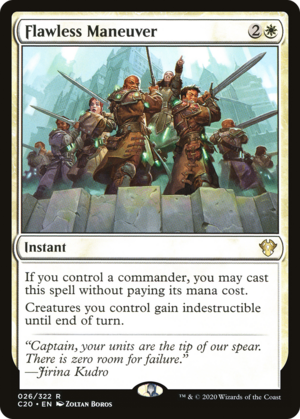
Card Details
Info
| Color: | |
| Identifies: | |
| Cost: |
|
| Rarity: | Rare |
| Converted Cost: | 3 |
| Power/Toughness: | / |
| Types: | |
| SubTypes: | |
| Languages: | 
        |
| Layout: | Normal |
| Rank: | |
| Saltiness: |
Rules
Prices
Legalities
Standard
Standardbrawl
Vintage
Modern
Brawl
Historic
Duel
Alchemy
Predh
Oathbreaker
Commander
Pioneer
Oldschool
Timeless
Premodern
Penny
Pauper
Gladiator
Paupercommander
Future
Legacy
Text
If you control a commander, you may cast this spell without paying its mana cost. Creatures you control gain indestructible until end of turn.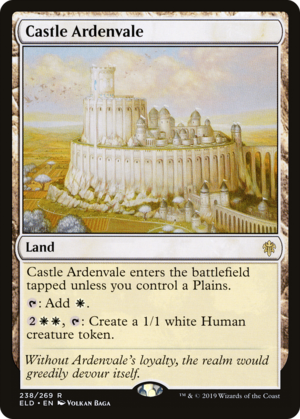
Card Details
Info
| Color: | |
| Identifies: | |
| Cost: | |
| Rarity: | Rare |
| Converted Cost: | 0 |
| Power/Toughness: | / |
| Types: | |
| SubTypes: | |
| Languages: | 
          |
| Layout: | Normal |
| Rank: | |
| Saltiness: | |
| Tokens: |
Rules
Prices
Legalities
Standard
Standardbrawl
Vintage
Modern
Brawl
Historic
Duel
Alchemy
Predh
Oathbreaker
Commander
Pioneer
Oldschool
Timeless
Premodern
Penny
Pauper
Gladiator
Paupercommander
Future
Legacy
Text
This land enters tapped unless you control a Plains.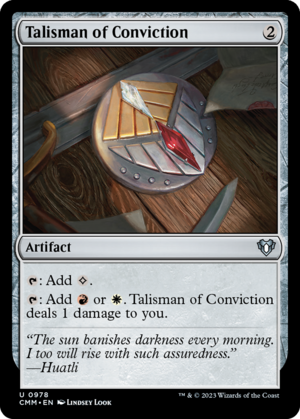
Card Details
Info
| Color: | |
| Identifies: | |
| Cost: |
|
| Rarity: | Uncommon |
| Converted Cost: | 2 |
| Power/Toughness: | / |
| Types: | |
| SubTypes: | |
| Languages: | 
          |
| Layout: | Normal |
| Rank: | |
| Saltiness: |
Rules
Text
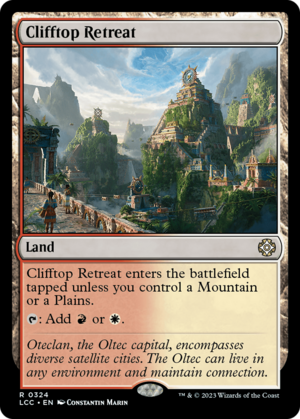
Card Details
Info
| Color: | |
| Identifies: | |
| Cost: | |
| Rarity: | Rare |
| Converted Cost: | 0 |
| Power/Toughness: | / |
| Types: | |
| SubTypes: | |
| Languages: | 
          |
| Layout: | Normal |
| Rank: | |
| Saltiness: |
Rules
Text
This land enters tapped unless you control a Mountain or a Plains.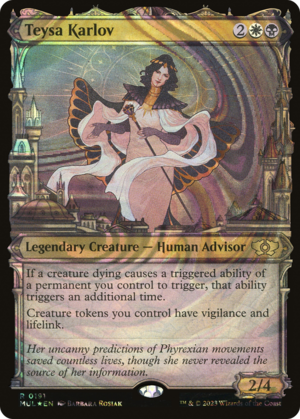
Card Details
Info
| Color: | |
| Identifies: | |
| Cost: |
|
| Rarity: | Rare |
| Converted Cost: | 4 |
| Power/Toughness: | 2/4 |
| Types: | |
| SubTypes: | |
| Languages: | 
          |
| Layout: | Normal |
| Rank: | |
| Saltiness: |
Rules
Text
If a creature dying causes a triggered ability of a permanent you control to trigger, that ability triggers an additional time. Creature tokens you control have vigilance and lifelink.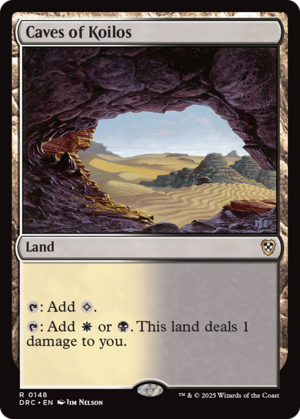
Card Details
Info
| Color: | |
| Identifies: | |
| Cost: | |
| Rarity: | Rare |
| Converted Cost: | 0 |
| Power/Toughness: | / |
| Types: | |
| SubTypes: | |
| Languages: | 
          |
| Layout: | Normal |
| Rank: | |
| Saltiness: |
Rules
Prices
Legalities
Standard
Standardbrawl
Vintage
Modern
Brawl
Historic
Duel
Alchemy
Predh
Oathbreaker
Commander
Pioneer
Oldschool
Timeless
Premodern
Penny
Pauper
Gladiator
Paupercommander
Future
Legacy
Text
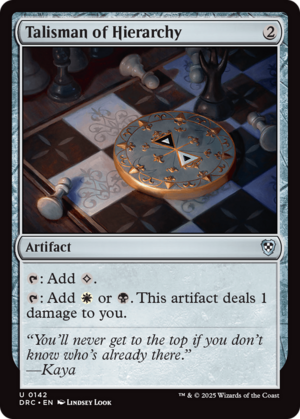
Card Details
Info
| Color: | |
| Identifies: | |
| Cost: |
|
| Rarity: | Uncommon |
| Converted Cost: | 2 |
| Power/Toughness: | / |
| Types: | |
| SubTypes: | |
| Languages: | 
          |
| Layout: | Normal |
| Rank: | |
| Saltiness: |
Rules
Text
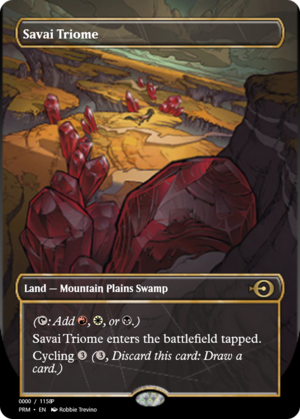
Card Details
Info
| Color: | |
| Identifies: | |
| Cost: | |
| Rarity: | Rare |
| Converted Cost: | 0 |
| Power/Toughness: | / |
| Types: | |
| SubTypes: | |
| Languages: | 
|
| Layout: | Normal |
| Rank: | |
| Saltiness: |
Abilities/Keywords
Rules
Prices
| Seller | Price |
|---|
Legalities
Standard
Standardbrawl
Vintage
Modern
Brawl
Historic
Duel
Alchemy
Predh
Oathbreaker
Commander
Pioneer
Oldschool
Timeless
Premodern
Penny
Pauper
Gladiator
Paupercommander
Future
Legacy
Text
(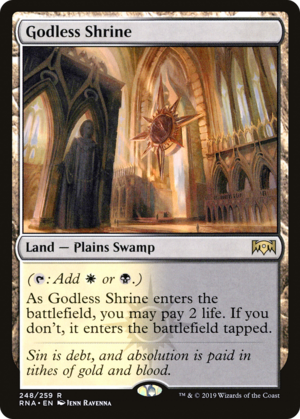
Card Details
Info
| Color: | |
| Identifies: | |
| Cost: | |
| Rarity: | Rare |
| Converted Cost: | 0 |
| Power/Toughness: | / |
| Types: | |
| SubTypes: | |
| Languages: | 
          |
| Layout: | Normal |
| Rank: | |
| Saltiness: |
Rules
Prices
Legalities
Standard
Standardbrawl
Vintage
Modern
Brawl
Historic
Duel
Alchemy
Predh
Oathbreaker
Commander
Pioneer
Oldschool
Timeless
Premodern
Penny
Pauper
Gladiator
Paupercommander
Future
Legacy
Text
(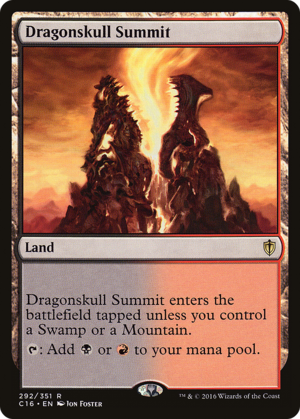
Card Details
Info
| Color: | |
| Identifies: | |
| Cost: | |
| Rarity: | Rare |
| Converted Cost: | 0 |
| Power/Toughness: | / |
| Types: | |
| SubTypes: | |
| Languages: | 
          |
| Layout: | Normal |
| Rank: | |
| Saltiness: |
Rules
Text
This land enters tapped unless you control a Swamp or a Mountain.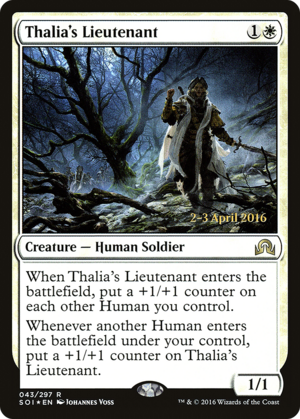
Card Details
Info
| Color: | |
| Identifies: | |
| Cost: |
|
| Rarity: | Rare |
| Converted Cost: | 2 |
| Power/Toughness: | 1/1 |
| Types: | |
| SubTypes: | |
| Languages: | 
          |
| Layout: | Normal |
| Rank: | |
| Saltiness: |
Rules
Prices
Legalities
Standard
Standardbrawl
Vintage
Modern
Brawl
Historic
Duel
Alchemy
Predh
Oathbreaker
Commander
Pioneer
Oldschool
Timeless
Premodern
Penny
Pauper
Gladiator
Paupercommander
Future
Legacy
Text
When this creature enters, put a +1/+1counteron each other Human you control. Whenever another Human you control enters, put a +1/+1counteron this creature.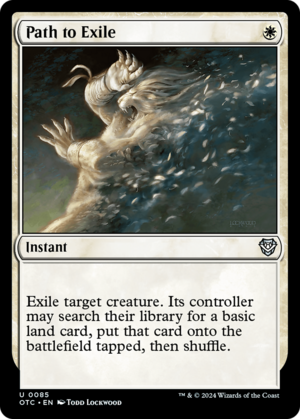
Card Details
Info
| Color: | |
| Identifies: | |
| Cost: |
|
| Rarity: | Uncommon |
| Converted Cost: | 1 |
| Power/Toughness: | / |
| Types: | |
| SubTypes: | |
| Languages: | 
         |
| Layout: | Normal |
| Rank: | |
| Saltiness: |
Rules
Text
Exile target creature. Its controller may search their library for a basic land card, put that card onto the battlefield tapped, thenshuffle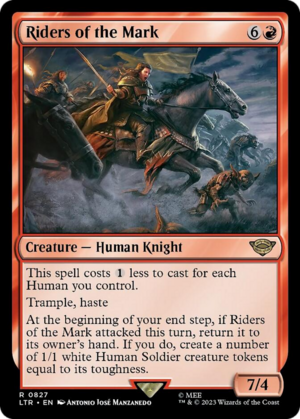
Card Details
Info
| Color: | |
| Identifies: | |
| Cost: |
|
| Rarity: | Rare |
| Converted Cost: | 7 |
| Power/Toughness: | 7/4 |
| Types: | |
| SubTypes: | |
| Languages: | 
|
| Layout: | Normal |
| Rank: | |
| Saltiness: | |
| Tokens: |
Abilities/Keywords
Rules
Prices
Legalities
Standard
Standardbrawl
Vintage
Modern
Brawl
Historic
Duel
Alchemy
Predh
Oathbreaker
Commander
Pioneer
Oldschool
Timeless
Premodern
Penny
Pauper
Gladiator
Paupercommander
Future
Legacy
Text
Affinity for Humans (This spell costs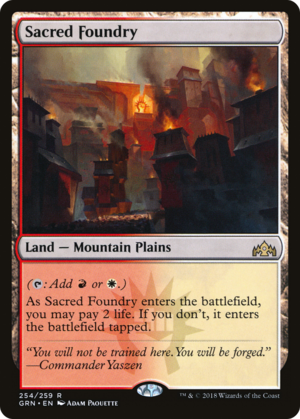
Card Details
Info
| Color: | |
| Identifies: | |
| Cost: | |
| Rarity: | Rare |
| Converted Cost: | 0 |
| Power/Toughness: | / |
| Types: | |
| SubTypes: | |
| Languages: | 
          |
| Layout: | Normal |
| Rank: | |
| Saltiness: |
Rules
Prices
Legalities
Standard
Standardbrawl
Vintage
Modern
Brawl
Historic
Duel
Alchemy
Predh
Oathbreaker
Commander
Pioneer
Oldschool
Timeless
Premodern
Penny
Pauper
Gladiator
Paupercommander
Future
Legacy
Text
(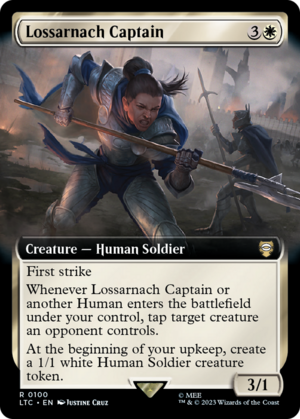
Card Details
Info
| Color: | |
| Identifies: | |
| Cost: |
|
| Rarity: | Rare |
| Converted Cost: | 4 |
| Power/Toughness: | 3/1 |
| Types: | |
| SubTypes: | |
| Languages: | 
    |
| Layout: | Normal |
| Rank: | |
| Saltiness: | |
| Tokens: |
Abilities/Keywords
Rules
Prices
Legalities
Standard
Standardbrawl
Vintage
Modern
Brawl
Historic
Duel
Alchemy
Predh
Oathbreaker
Commander
Pioneer
Oldschool
Timeless
Premodern
Penny
Pauper
Gladiator
Paupercommander
Future
Legacy
Text
First strike Whenever this creature or another Human you control enters, tap target creature an opponent controls. At the beginning of your upkeep, create a 1/1 white Human Soldier creature token.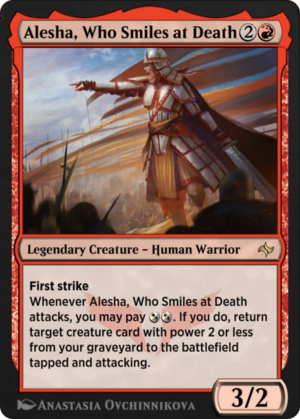
Card Details
Info
| Color: | |
| Identifies: | |
| Cost: |
|
| Rarity: | Rare |
| Converted Cost: | 3 |
| Power/Toughness: | 3/2 |
| Types: | |
| SubTypes: | |
| Languages: | 
          |
| Layout: | Normal |
| Rank: | |
| Saltiness: |
Abilities/Keywords
Rules
Prices
| Seller | Price |
|---|
Legalities
Standard
Standardbrawl
Vintage
Modern
Brawl
Historic
Duel
Alchemy
Predh
Oathbreaker
Commander
Pioneer
Oldschool
Timeless
Premodern
Penny
Pauper
Gladiator
Paupercommander
Future
Legacy
Text
First strike Whenever Alesha attacks, you may pay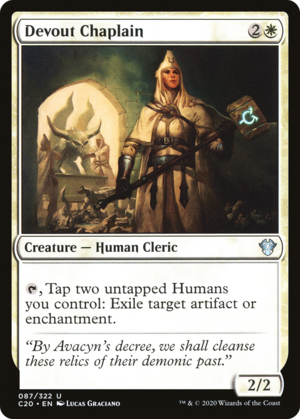
Card Details
Info
| Color: | |
| Identifies: | |
| Cost: |
|
| Rarity: | Uncommon |
| Converted Cost: | 3 |
| Power/Toughness: | 2/2 |
| Types: | |
| SubTypes: | |
| Languages: | 
          |
| Layout: | Normal |
| Rank: | |
| Saltiness: |
Rules
Text
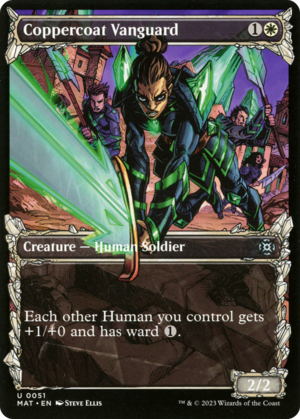
Card Details
Info
| Color: | |
| Identifies: | |
| Cost: |
|
| Rarity: | Uncommon |
| Converted Cost: | 2 |
| Power/Toughness: | 2/2 |
| Types: | |
| SubTypes: | |
| Languages: | 
       |
| Layout: | Normal |
| Rank: | |
| Saltiness: |
Rules
Prices
Legalities
Standard
Standardbrawl
Vintage
Modern
Brawl
Historic
Duel
Alchemy
Predh
Oathbreaker
Commander
Pioneer
Oldschool
Timeless
Premodern
Penny
Pauper
Gladiator
Paupercommander
Future
Legacy
Text
Each other Human you control gets +1/+0 and has ward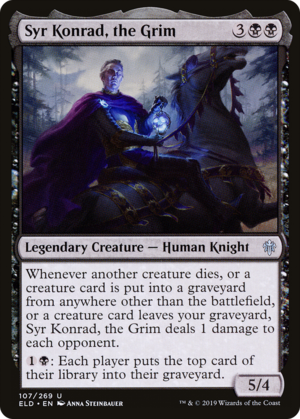
Card Details
Info
| Color: | |
| Identifies: | |
| Cost: |
|
| Rarity: | Uncommon |
| Converted Cost: | 5 |
| Power/Toughness: | 5/4 |
| Types: | |
| SubTypes: | |
| Languages: | 
          |
| Layout: | Normal |
| Rank: | |
| Saltiness: |
Abilities/Keywords
Rules
Prices
Legalities
Standard
Standardbrawl
Vintage
Modern
Brawl
Historic
Duel
Alchemy
Predh
Oathbreaker
Commander
Pioneer
Oldschool
Timeless
Premodern
Penny
Pauper
Gladiator
Paupercommander
Future
Legacy
Text
Whenever another creature dies, or a creature card is put into a graveyard from anywhere other than the battlefield, or a creature card leaves your graveyard, Syr Konrad deals 1 damage to each opponent.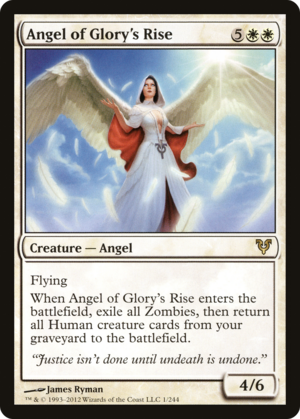
Card Details
Info
| Color: | |
| Identifies: | |
| Cost: |
|
| Rarity: | Rare |
| Converted Cost: | 7 |
| Power/Toughness: | 4/6 |
| Types: | |
| SubTypes: | |
| Languages: | 
          |
| Layout: | Normal |
| Rank: | |
| Saltiness: |
Abilities/Keywords
Rules
Prices
Legalities
Standard
Standardbrawl
Vintage
Modern
Brawl
Historic
Duel
Alchemy
Predh
Oathbreaker
Commander
Pioneer
Oldschool
Timeless
Premodern
Penny
Pauper
Gladiator
Paupercommander
Future
Legacy
Text
Flying When this creature enters, exile all Zombies, then return all Human creature cards from your graveyard to the battlefield.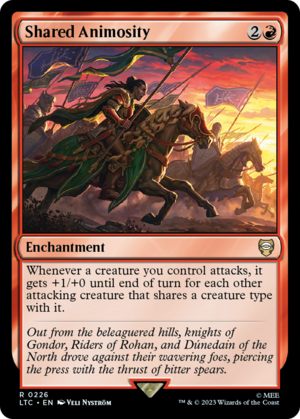
Card Details
Info
| Color: | |
| Identifies: | |
| Cost: |
|
| Rarity: | Rare |
| Converted Cost: | 3 |
| Power/Toughness: | / |
| Types: | |
| SubTypes: | |
| Languages: | 
        |
| Layout: | Normal |
| Rank: | |
| Saltiness: |
Rules
Text
Whenever a creature you control attacks, it gets +1/+0 until end of turn for each other attacking creature that shares a creature type with it.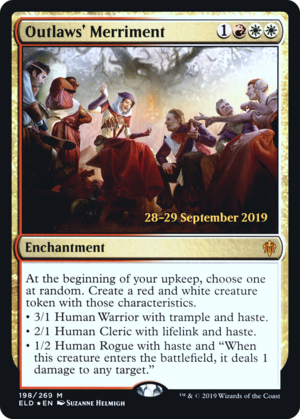
Card Details
Info
| Color: | |
| Identifies: | |
| Cost: |
|
| Rarity: | Mythic |
| Converted Cost: | 4 |
| Power/Toughness: | / |
| Types: | |
| SubTypes: | |
| Languages: | 
       |
| Layout: | Normal |
| Rank: | |
| Saltiness: | |
| Tokens: |
Rules
Text
At the beginning of your upkeep, choose one at random. Create a red and white creature token with those characteristics. • 3/1 Human Warrior with trample and haste. • 2/1 Human Cleric with lifelink and haste. • 1/2 Human Rogue with haste and "When this token enters, it deals 1 damage to any target."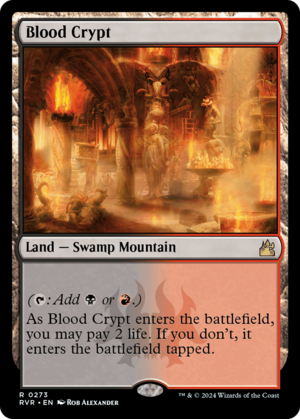
Card Details
Info
| Color: | |
| Identifies: | |
| Cost: | |
| Rarity: | Rare |
| Converted Cost: | 0 |
| Power/Toughness: | / |
| Types: | |
| SubTypes: | |
| Languages: | 
          |
| Layout: | Normal |
| Rank: | |
| Saltiness: |
Rules
Prices
Legalities
Standard
Standardbrawl
Vintage
Modern
Brawl
Historic
Duel
Alchemy
Predh
Oathbreaker
Commander
Pioneer
Oldschool
Timeless
Premodern
Penny
Pauper
Gladiator
Paupercommander
Future
Legacy
Text
(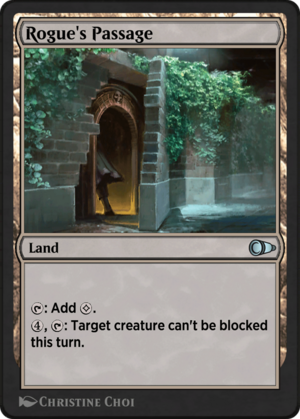
Card Details
Info
| Color: | |
| Identifies: | |
| Cost: | |
| Rarity: | Uncommon |
| Converted Cost: | 0 |
| Power/Toughness: | / |
| Types: | |
| SubTypes: | |
| Languages: | 
          |
| Layout: | Normal |
| Rank: | |
| Saltiness: |
Rules
Prices
| Seller | Price |
|---|
Legalities
Standard
Standardbrawl
Vintage
Modern
Brawl
Historic
Duel
Alchemy
Predh
Oathbreaker
Commander
Pioneer
Oldschool
Timeless
Premodern
Penny
Pauper
Gladiator
Paupercommander
Future
Legacy
Text
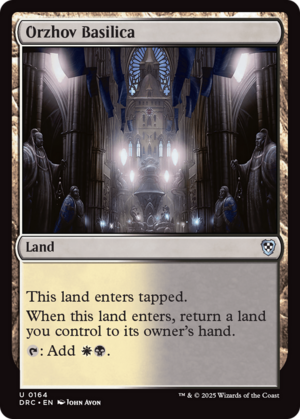
Card Details
Info
| Color: | |
| Identifies: | |
| Cost: | |
| Rarity: | Uncommon |
| Converted Cost: | 0 |
| Power/Toughness: | / |
| Types: | |
| SubTypes: | |
| Languages: | 
         |
| Layout: | Normal |
| Rank: | |
| Saltiness: |
Rules
Text
This land enters tapped. When this land enters, return a land you control to its owner's hand.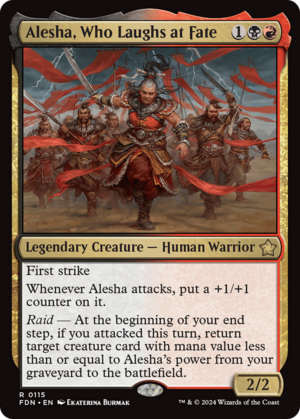
Card Details
Info
| Color: | |
| Identifies: | |
| Cost: |
|
| Rarity: | Rare |
| Converted Cost: | 3 |
| Power/Toughness: | 2/2 |
| Types: | |
| SubTypes: | |
| Languages: | 
     |
| Layout: | Normal |
| Rank: | |
| Saltiness: |
Abilities/Keywords
Rules
Prices
Legalities
Standard
Standardbrawl
Vintage
Modern
Brawl
Historic
Duel
Alchemy
Predh
Oathbreaker
Commander
Pioneer
Oldschool
Timeless
Premodern
Penny
Pauper
Gladiator
Paupercommander
Future
Legacy
Text
First strike Whenever Alesha attacks, put a +1/+1counteron it. Raid — At the beginning of your end step, if you attacked this turn, return target creature card with mana value less than or equal to Alesha's power from your graveyard to the battlefield.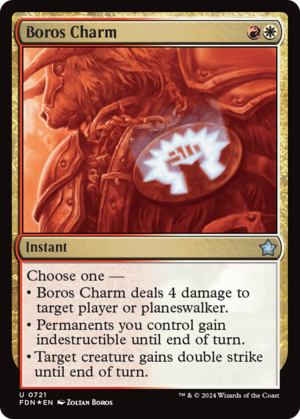
Card Details
Info
| Color: | |
| Identifies: | |
| Cost: |
|
| Rarity: | Uncommon |
| Converted Cost: | 2 |
| Power/Toughness: | / |
| Types: | |
| SubTypes: | |
| Languages: | 
          |
| Layout: | Normal |
| Rank: | |
| Saltiness: |
Rules
Text
Choose one — • Boros Charm deals 4 damage to target player or planeswalker. • Permanents you control gain indestructible until end of turn. • Target creature gains double strike until end of turn.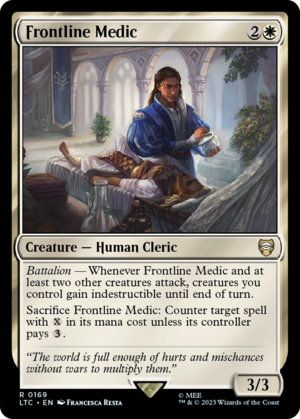
Card Details
Info
| Color: | |
| Identifies: | |
| Cost: |
|
| Rarity: | Rare |
| Converted Cost: | 3 |
| Power/Toughness: | 3/3 |
| Types: | |
| SubTypes: | |
| Languages: | 
          |
| Layout: | Normal |
| Rank: | |
| Saltiness: |
Abilities/Keywords
Rules
Text
Battalion — Whenever this creature and at least two other creatures attack, creatures you control gain indestructible until end of turn. Sacrifice this creature:Countertarget spell with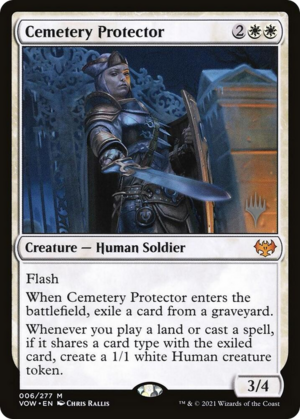
Card Details
Info
| Color: | |
| Identifies: | |
| Cost: |
|
| Rarity: | Mythic |
| Converted Cost: | 4 |
| Power/Toughness: | 3/4 |
| Types: | |
| SubTypes: | |
| Languages: | 
          |
| Layout: | Normal |
| Rank: | |
| Saltiness: | |
| Tokens: |
Abilities/Keywords
Rules
Prices
Legalities
Standard
Standardbrawl
Vintage
Modern
Brawl
Historic
Duel
Alchemy
Predh
Oathbreaker
Commander
Pioneer
Oldschool
Timeless
Premodern
Penny
Pauper
Gladiator
Paupercommander
Future
Legacy
Text
Flash When this creature enters, exile a card from a graveyard. Whenever you play a land or cast a spell, if it shares a card type with the exiled card, create a 1/1 white Human creature token.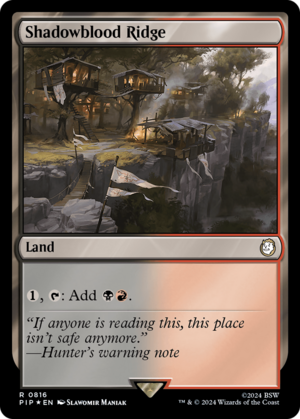
Card Details
Info
| Color: | |
| Identifies: | |
| Cost: | |
| Rarity: | Rare |
| Converted Cost: | 0 |
| Power/Toughness: | / |
| Types: | |
| SubTypes: | |
| Languages: | 
         |
| Layout: | Normal |
| Rank: | |
| Saltiness: |
Rules
Text
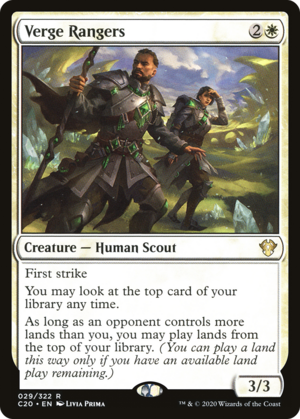
Card Details
Info
| Color: | |
| Identifies: | |
| Cost: |
|
| Rarity: | Rare |
| Converted Cost: | 3 |
| Power/Toughness: | 3/3 |
| Types: | |
| SubTypes: | |
| Languages: | 
       |
| Layout: | Normal |
| Rank: | |
| Saltiness: |
Abilities/Keywords
Rules
Text
First strike You may look at the top card of your library any time. As long as an opponent controls more lands than you, you may play lands from the top of your library. (You can play a land this way only if you have an available land play remaining.)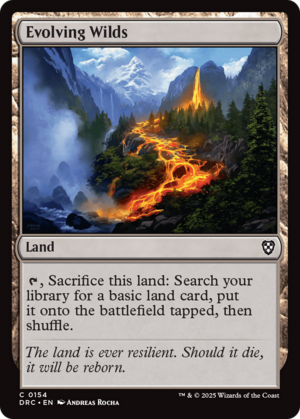
Card Details
Info
| Color: | |
| Identifies: | |
| Cost: | |
| Rarity: | Common |
| Converted Cost: | 0 |
| Power/Toughness: | / |
| Types: | |
| SubTypes: | |
| Languages: | 
          |
| Layout: | Normal |
| Rank: | |
| Saltiness: |
Rules
Text
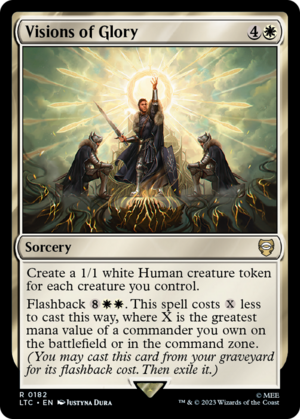
Card Details
Info
| Color: | |
| Identifies: | |
| Cost: |
|
| Rarity: | Rare |
| Converted Cost: | 5 |
| Power/Toughness: | / |
| Types: | |
| SubTypes: | |
| Languages: | 
         |
| Layout: | Normal |
| Rank: | |
| Saltiness: | |
| Tokens: |
Abilities/Keywords
Rules
Prices
Legalities
Standard
Standardbrawl
Vintage
Modern
Brawl
Historic
Duel
Alchemy
Predh
Oathbreaker
Commander
Pioneer
Oldschool
Timeless
Premodern
Penny
Pauper
Gladiator
Paupercommander
Future
Legacy
Text
Create a 1/1 white Human creature token for each creature you control. Flashback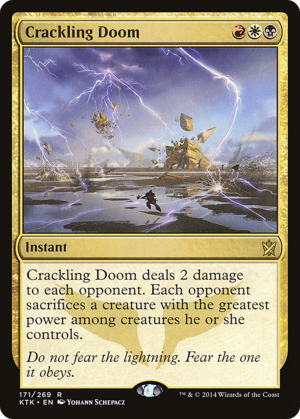
Card Details
Info
| Color: | |
| Identifies: | |
| Cost: |
|
| Rarity: | Rare |
| Converted Cost: | 3 |
| Power/Toughness: | / |
| Types: | |
| SubTypes: | |
| Languages: | 
          |
| Layout: | Normal |
| Rank: | |
| Saltiness: |
Rules
Prices
Legalities
Standard
Standardbrawl
Vintage
Modern
Brawl
Historic
Duel
Alchemy
Predh
Oathbreaker
Commander
Pioneer
Oldschool
Timeless
Premodern
Penny
Pauper
Gladiator
Paupercommander
Future
Legacy
Text
Crackling Doom deals 2 damage to each opponent. Each opponent sacrifices a creature with the greatest power among creatures that player controls.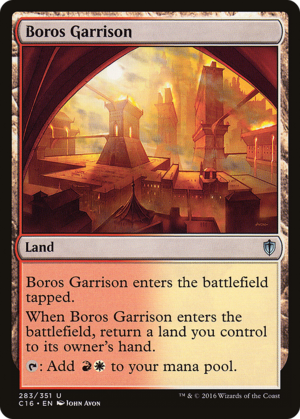
Card Details
Info
| Color: | |
| Identifies: | |
| Cost: | |
| Rarity: | Uncommon |
| Converted Cost: | 0 |
| Power/Toughness: | / |
| Types: | |
| SubTypes: | |
| Languages: | 
         |
| Layout: | Normal |
| Rank: | |
| Saltiness: |
Rules
Text
This land enters tapped. When this land enters, return a land you control to its owner's hand.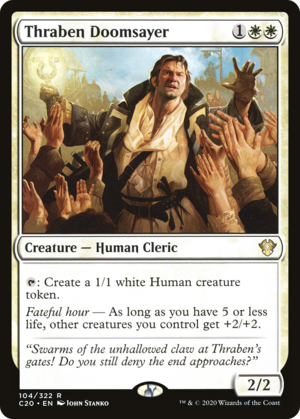
Card Details
Info
| Color: | |
| Identifies: | |
| Cost: |
|
| Rarity: | Rare |
| Converted Cost: | 3 |
| Power/Toughness: | 2/2 |
| Types: | |
| SubTypes: | |
| Languages: | 
          |
| Layout: | Normal |
| Rank: | |
| Saltiness: | |
| Tokens: |
Abilities/Keywords
Rules
Prices
Legalities
Standard
Standardbrawl
Vintage
Modern
Brawl
Historic
Duel
Alchemy
Predh
Oathbreaker
Commander
Pioneer
Oldschool
Timeless
Premodern
Penny
Pauper
Gladiator
Paupercommander
Future
Legacy
Text
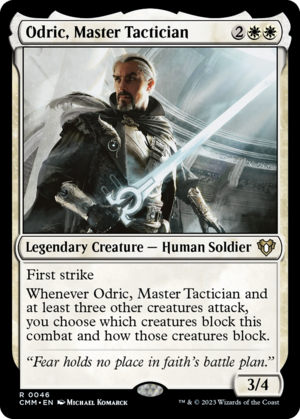
Card Details
Info
| Color: | |
| Identifies: | |
| Cost: |
|
| Rarity: | Rare |
| Converted Cost: | 4 |
| Power/Toughness: | 3/4 |
| Types: | |
| SubTypes: | |
| Languages: | 
          |
| Layout: | Normal |
| Rank: | |
| Saltiness: |
Abilities/Keywords
Rules
Prices
Legalities
Standard
Standardbrawl
Vintage
Modern
Brawl
Historic
Duel
Alchemy
Predh
Oathbreaker
Commander
Pioneer
Oldschool
Timeless
Premodern
Penny
Pauper
Gladiator
Paupercommander
Future
Legacy
Text
First strike (This creature deals combat damage before creatures without first strike.) Whenever Odric and at least three other creatures attack, you choose which creatures block this combat and how those creatures block.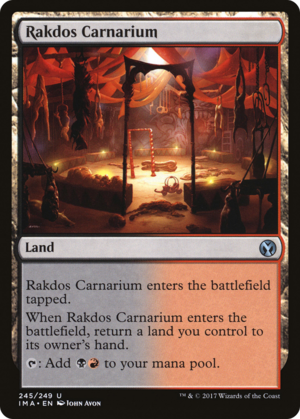
Card Details
Info
| Color: | |
| Identifies: | |
| Cost: | |
| Rarity: | Uncommon |
| Converted Cost: | 0 |
| Power/Toughness: | / |
| Types: | |
| SubTypes: | |
| Languages: | 
         |
| Layout: | Normal |
| Rank: | |
| Saltiness: |
Rules
Prices
Legalities
Standard
Standardbrawl
Vintage
Modern
Brawl
Historic
Duel
Alchemy
Predh
Oathbreaker
Commander
Pioneer
Oldschool
Timeless
Premodern
Penny
Pauper
Gladiator
Paupercommander
Future
Legacy
Text
This land enters tapped. When this land enters, return a land you control to its owner's hand.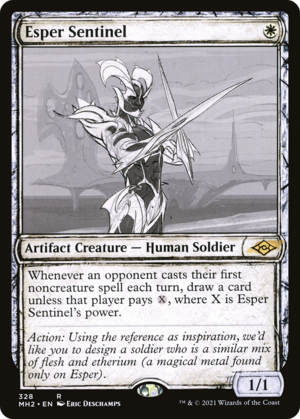
Card Details
Info
| Color: | |
| Identifies: | |
| Cost: |
|
| Rarity: | Rare |
| Converted Cost: | 1 |
| Power/Toughness: | 1/1 |
| Types: | |
| SubTypes: | |
| Languages: | 
          |
| Layout: | Normal |
| Rank: | |
| Saltiness: |
Rules
Prices
Legalities
Standard
Standardbrawl
Vintage
Modern
Brawl
Historic
Duel
Alchemy
Predh
Oathbreaker
Commander
Pioneer
Oldschool
Timeless
Premodern
Penny
Pauper
Gladiator
Paupercommander
Future
Legacy
Text
Whenever an opponent casts their first noncreature spell each turn, draw a card unless that player pays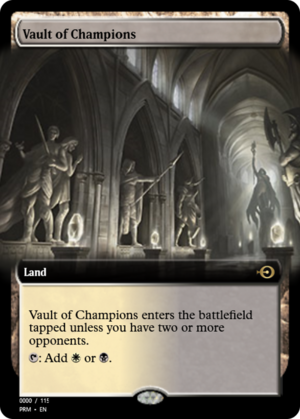
Card Details
Info
| Color: | |
| Identifies: | |
| Cost: | |
| Rarity: | Rare |
| Converted Cost: | 0 |
| Power/Toughness: | / |
| Types: | |
| SubTypes: | |
| Languages: | 
        |
| Layout: | Normal |
| Rank: | |
| Saltiness: |
Rules
Prices
| Seller | Price |
|---|
Legalities
Standard
Standardbrawl
Vintage
Modern
Brawl
Historic
Duel
Alchemy
Predh
Oathbreaker
Commander
Pioneer
Oldschool
Timeless
Premodern
Penny
Pauper
Gladiator
Paupercommander
Future
Legacy
Text
This land enters tapped unless you have two or more opponents.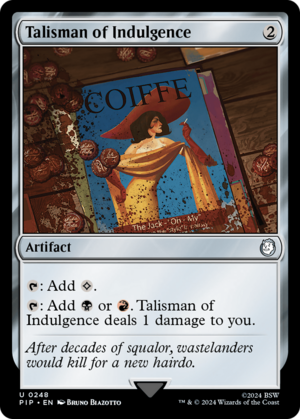
Card Details
Info
| Color: | |
| Identifies: | |
| Cost: |
|
| Rarity: | Uncommon |
| Converted Cost: | 2 |
| Power/Toughness: | / |
| Types: | |
| SubTypes: | |
| Languages: | 
         |
| Layout: | Normal |
| Rank: | |
| Saltiness: |
Rules
Prices
Legalities
Standard
Standardbrawl
Vintage
Modern
Brawl
Historic
Duel
Alchemy
Predh
Oathbreaker
Commander
Pioneer
Oldschool
Timeless
Premodern
Penny
Pauper
Gladiator
Paupercommander
Future
Legacy
Text
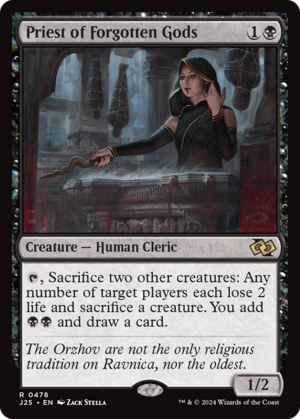
Card Details
Info
| Color: | |
| Identifies: | |
| Cost: |
|
| Rarity: | Rare |
| Converted Cost: | 2 |
| Power/Toughness: | 1/2 |
| Types: | |
| SubTypes: | |
| Languages: | 
          |
| Layout: | Normal |
| Rank: | |
| Saltiness: |
Rules
Text
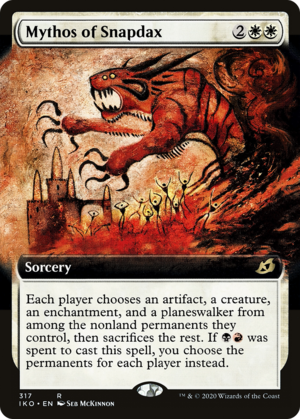
Card Details
Info
| Color: | |
| Identifies: | |
| Cost: |
|
| Rarity: | Rare |
| Converted Cost: | 4 |
| Power/Toughness: | / |
| Types: | |
| SubTypes: | |
| Languages: | 
          |
| Layout: | Normal |
| Rank: | |
| Saltiness: |
Rules
Prices
Legalities
Standard
Standardbrawl
Vintage
Modern
Brawl
Historic
Duel
Alchemy
Predh
Oathbreaker
Commander
Pioneer
Oldschool
Timeless
Premodern
Penny
Pauper
Gladiator
Paupercommander
Future
Legacy
Text
Each player chooses an artifact, a creature, an enchantment, and a planeswalker from among the nonland permanents they control, then sacrifices the rest. If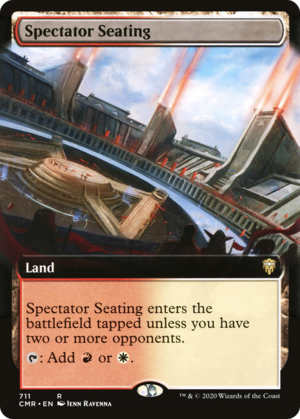
Card Details
Info
| Color: | |
| Identifies: | |
| Cost: | |
| Rarity: | Rare |
| Converted Cost: | 0 |
| Power/Toughness: | / |
| Types: | |
| SubTypes: | |
| Languages: | 
        |
| Layout: | Normal |
| Rank: | |
| Saltiness: |
Rules
Prices
Legalities
Standard
Standardbrawl
Vintage
Modern
Brawl
Historic
Duel
Alchemy
Predh
Oathbreaker
Commander
Pioneer
Oldschool
Timeless
Premodern
Penny
Pauper
Gladiator
Paupercommander
Future
Legacy
Text
This land enters tapped unless you have two or more opponents.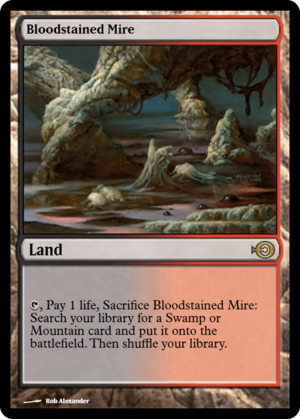
Card Details
Info
| Color: | |
| Identifies: | |
| Cost: | |
| Rarity: | Rare |
| Converted Cost: | 0 |
| Power/Toughness: | / |
| Types: | |
| SubTypes: | |
| Languages: | 
          |
| Layout: | Normal |
| Rank: | |
| Saltiness: |
Rules
Prices
| Seller | Price |
|---|
Legalities
Standard
Standardbrawl
Vintage
Modern
Brawl
Historic
Duel
Alchemy
Predh
Oathbreaker
Commander
Pioneer
Oldschool
Timeless
Premodern
Penny
Pauper
Gladiator
Paupercommander
Future
Legacy
Text
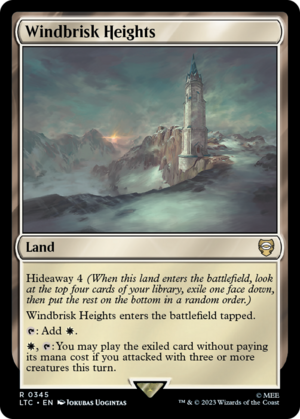
Card Details
Info
| Color: | |
| Identifies: | |
| Cost: | |
| Rarity: | Rare |
| Converted Cost: | 0 |
| Power/Toughness: | / |
| Types: | |
| SubTypes: | |
| Languages: | 
         |
| Layout: | Normal |
| Rank: | |
| Saltiness: |
Abilities/Keywords
Rules
Text
Hideaway 4 (When this land enters, look at the top four cards of your library, exile one face down, then put the rest on the bottom in a random order.) This land enters tapped.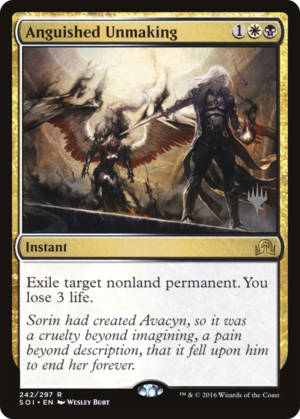
Card Details
Info
| Color: | |
| Identifies: | |
| Cost: |
|
| Rarity: | Rare |
| Converted Cost: | 3 |
| Power/Toughness: | / |
| Types: | |
| SubTypes: | |
| Languages: | 
          |
| Layout: | Normal |
| Rank: | |
| Saltiness: |
Rules
Prices
Legalities
Standard
Standardbrawl
Vintage
Modern
Brawl
Historic
Duel
Alchemy
Predh
Oathbreaker
Commander
Pioneer
Oldschool
Timeless
Premodern
Penny
Pauper
Gladiator
Paupercommander
Future
Legacy
Text
Exile target nonland permanent. You lose 3 life.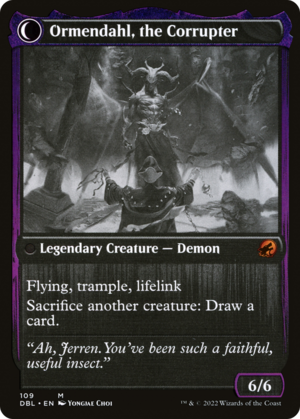
Card Details
Jerren, Corrupted Bishop (Jerren, Corrupted Bishop // Ormendahl, the Corrupter) #109 Legendary Creature — Human Cleric
Info
| Color: | |
| Identifies: | |
| Cost: |
|
| Rarity: | Mythic |
| Converted Cost: | 3 |
| Power/Toughness: | 2/3 |
| Types: | |
| SubTypes: | |
| Languages: | 
|
| Layout: | Transform |
| Rank: | |
| Saltiness: | |
| Tokens: |
Abilities/Keywords
Rules
Prices
Legalities
Standard
Standardbrawl
Vintage
Modern
Brawl
Historic
Duel
Alchemy
Predh
Oathbreaker
Commander
Pioneer
Oldschool
Timeless
Premodern
Penny
Pauper
Gladiator
Paupercommander
Future
Legacy
Text
Whenever Jerren enters or another nontoken Human you control dies, you lose 1 life and create a 1/1 white Human creature token.Ormendahl, the Corrupter (Jerren, Corrupted Bishop // Ormendahl, the Corrupter) #109 Legendary Creature — Demon
Info
| Color: | |
| Identifies: | |
| Cost: | |
| Rarity: | Mythic |
| Converted Cost: | 3 |
| Power/Toughness: | 6/6 |
| Types: | |
| SubTypes: | |
| Languages: | 
|
| Layout: | Transform |
| Rank: | |
| Saltiness: | |
| Tokens: |
Abilities/Keywords
Rules
Prices
Legalities
Standard
Standardbrawl
Vintage
Modern
Brawl
Historic
Duel
Alchemy
Predh
Oathbreaker
Commander
Pioneer
Oldschool
Timeless
Premodern
Penny
Pauper
Gladiator
Paupercommander
Future
Legacy
Text
Flying, trample, lifelink Sacrifice another creature: Draw a card.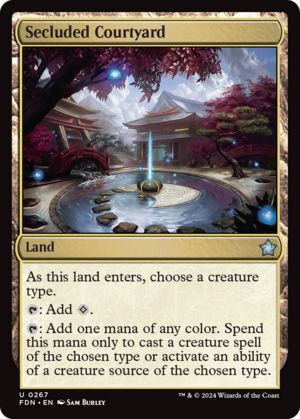
Card Details
Info
| Color: | |
| Identifies: | |
| Cost: | |
| Rarity: | Uncommon |
| Converted Cost: | 0 |
| Power/Toughness: | / |
| Types: | |
| SubTypes: | |
| Languages: | 
          |
| Layout: | Normal |
| Rank: | |
| Saltiness: |
Rules
Prices
Legalities
Standard
Standardbrawl
Vintage
Modern
Brawl
Historic
Duel
Alchemy
Predh
Oathbreaker
Commander
Pioneer
Oldschool
Timeless
Premodern
Penny
Pauper
Gladiator
Paupercommander
Future
Legacy
Text
As this land enters, choose a creature type.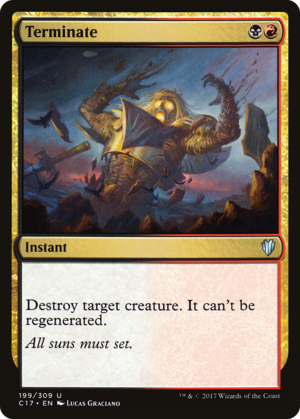
Card Details
Info
| Color: | |
| Identifies: | |
| Cost: |
|
| Rarity: | Uncommon |
| Converted Cost: | 2 |
| Power/Toughness: | / |
| Types: | |
| SubTypes: | |
| Languages: | 
         |
| Layout: | Normal |
| Rank: | |
| Saltiness: |
Rules
Text
Destroy target creature. It can't be regenerated.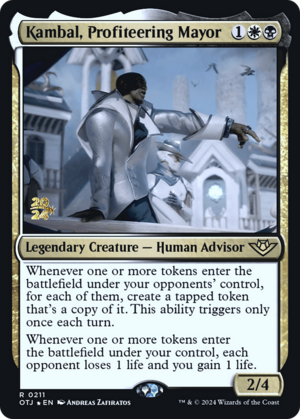
Card Details
Info
| Color: | |
| Identifies: | |
| Cost: |
|
| Rarity: | Rare |
| Converted Cost: | 3 |
| Power/Toughness: | 2/4 |
| Types: | |
| SubTypes: | |
| Languages: | 
    |
| Layout: | Normal |
| Rank: | |
| Saltiness: | |
| Tokens: |
Rules
Text
Whenever one or more tokens your opponents control enter, for each of them, create a tapped token that's a copy of it. This ability triggers only once each turn. Whenever one or more tokens you control enter, each opponent loses 1 life and you gain 1 life.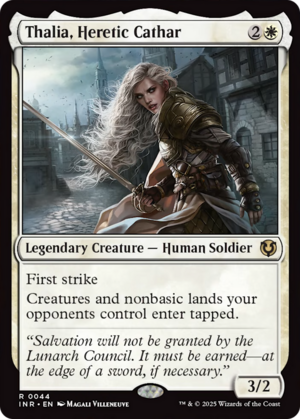
Card Details
Info
| Color: | |
| Identifies: | |
| Cost: |
|
| Rarity: | Rare |
| Converted Cost: | 3 |
| Power/Toughness: | 3/2 |
| Types: | |
| SubTypes: | |
| Languages: | 
          |
| Layout: | Normal |
| Rank: | |
| Saltiness: |
Abilities/Keywords
Rules
Prices
Legalities
Standard
Standardbrawl
Vintage
Modern
Brawl
Historic
Duel
Alchemy
Predh
Oathbreaker
Commander
Pioneer
Oldschool
Timeless
Premodern
Penny
Pauper
Gladiator
Paupercommander
Future
Legacy
Text
First strike Creatures and nonbasic lands your opponents control enter tapped.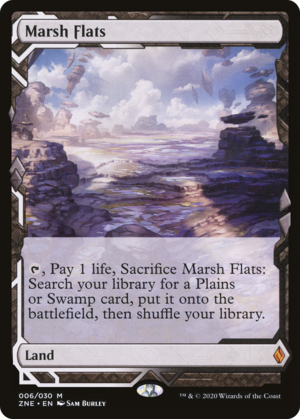
Card Details
Info
| Color: | |
| Identifies: | |
| Cost: | |
| Rarity: | Mythic |
| Converted Cost: | 0 |
| Power/Toughness: | / |
| Types: | |
| SubTypes: | |
| Languages: | 
          |
| Layout: | Normal |
| Rank: | |
| Saltiness: |
Rules
Prices
Legalities
Standard
Standardbrawl
Vintage
Modern
Brawl
Historic
Duel
Alchemy
Predh
Oathbreaker
Commander
Pioneer
Oldschool
Timeless
Premodern
Penny
Pauper
Gladiator
Paupercommander
Future
Legacy
Text
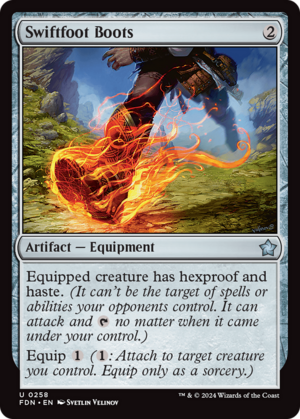
Card Details
Info
| Color: | |
| Identifies: | |
| Cost: |
|
| Rarity: | Uncommon |
| Converted Cost: | 2 |
| Power/Toughness: | / |
| Types: | |
| SubTypes: | |
| Languages: | 
          |
| Layout: | Normal |
| Rank: | |
| Saltiness: |
Abilities/Keywords
Rules
Prices
Legalities
Standard
Standardbrawl
Vintage
Modern
Brawl
Historic
Duel
Alchemy
Predh
Oathbreaker
Commander
Pioneer
Oldschool
Timeless
Premodern
Penny
Pauper
Gladiator
Paupercommander
Future
Legacy
Text
Equipped creature has hexproof and haste. (It can't be the target of spells or abilities your opponents control. It can attack and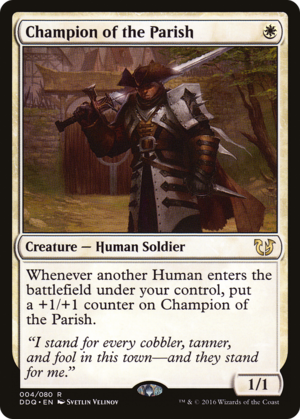
Card Details
Info
| Color: | |
| Identifies: | |
| Cost: |
|
| Rarity: | Rare |
| Converted Cost: | 1 |
| Power/Toughness: | 1/1 |
| Types: | |
| SubTypes: | |
| Languages: | 
          |
| Layout: | Normal |
| Rank: | |
| Saltiness: |
Rules
Text
Whenever another Human you control enters, put a +1/+1counteron this creature.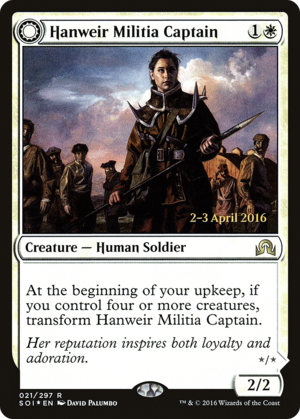
Card Details
Hanweir Militia Captain (Hanweir Militia Captain // Westvale Cult Leader) #21s Creature — Human Soldier
Info
| Color: | |
| Identifies: | |
| Cost: |
|
| Rarity: | Rare |
| Converted Cost: | 2 |
| Power/Toughness: | 2/2 |
| Types: | |
| SubTypes: | |
| Languages: | 
          |
| Layout: | Transform |
| Rank: | |
| Saltiness: | |
| Tokens: |
Abilities/Keywords
Rules
Prices
Legalities
Standard
Standardbrawl
Vintage
Modern
Brawl
Historic
Duel
Alchemy
Predh
Oathbreaker
Commander
Pioneer
Oldschool
Timeless
Premodern
Penny
Pauper
Gladiator
Paupercommander
Future
Legacy
Text
At the beginning of your upkeep, if you control four or more creatures, transform this creature.Info
| Color: | |
| Identifies: | |
| Cost: | |
| Rarity: | Rare |
| Converted Cost: | 2 |
| Power/Toughness: | */* |
| Types: | |
| SubTypes: | |
| Languages: | 
          |
| Layout: | Transform |
| Rank: | |
| Saltiness: | |
| Tokens: |
Abilities/Keywords
Rules
Prices
Legalities
Standard
Standardbrawl
Vintage
Modern
Brawl
Historic
Duel
Alchemy
Predh
Oathbreaker
Commander
Pioneer
Oldschool
Timeless
Premodern
Penny
Pauper
Gladiator
Paupercommander
Future
Legacy
Text
Westvale Cult Leader's power and toughness are each equal to the number of creatures you control. At the beginning of your end step, create a 1/1 white and black Human Cleric creature token.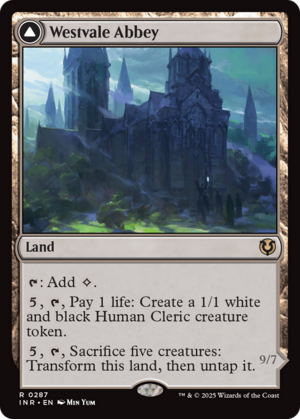
Card Details
Info
| Color: | |
| Identifies: | |
| Cost: | |
| Rarity: | Rare |
| Converted Cost: | 0 |
| Power/Toughness: | / |
| Types: | |
| SubTypes: | |
| Languages: | 
          |
| Layout: | Transform |
| Rank: | |
| Saltiness: | |
| Tokens: |
Abilities/Keywords
Rules
Prices
Legalities
Standard
Standardbrawl
Vintage
Modern
Brawl
Historic
Duel
Alchemy
Predh
Oathbreaker
Commander
Pioneer
Oldschool
Timeless
Premodern
Penny
Pauper
Gladiator
Paupercommander
Future
Legacy
Text
Ormendahl, Profane Prince (Westvale Abbey // Ormendahl, Profane Prince) #287 Legendary Creature — Demon
Info
| Color: | |
| Identifies: | |
| Cost: | |
| Rarity: | Rare |
| Converted Cost: | 0 |
| Power/Toughness: | 9/7 |
| Types: | |
| SubTypes: | |
| Languages: | 
          |
| Layout: | Transform |
| Rank: | |
| Saltiness: | |
| Tokens: |
Abilities/Keywords
Rules
Prices
Legalities
Standard
Standardbrawl
Vintage
Modern
Brawl
Historic
Duel
Alchemy
Predh
Oathbreaker
Commander
Pioneer
Oldschool
Timeless
Premodern
Penny
Pauper
Gladiator
Paupercommander
Future
Legacy
Text
Flying, lifelink, indestructible, haste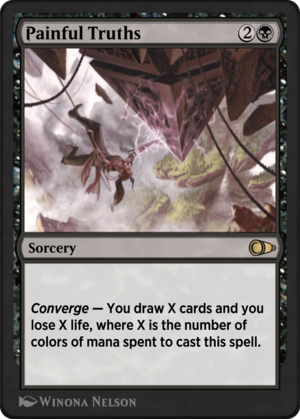
Card Details
Info
| Color: | |
| Identifies: | |
| Cost: |
|
| Rarity: | Rare |
| Converted Cost: | 3 |
| Power/Toughness: | / |
| Types: | |
| SubTypes: | |
| Languages: | 
          |
| Layout: | Normal |
| Rank: | |
| Saltiness: |
Abilities/Keywords
Rules
Prices
| Seller | Price |
|---|
Legalities
Standard
Standardbrawl
Vintage
Modern
Brawl
Historic
Duel
Alchemy
Predh
Oathbreaker
Commander
Pioneer
Oldschool
Timeless
Premodern
Penny
Pauper
Gladiator
Paupercommander
Future
Legacy
Text
Converge — You draw X cards and lose X life, where X is the number of colors of mana spent to cast this spell.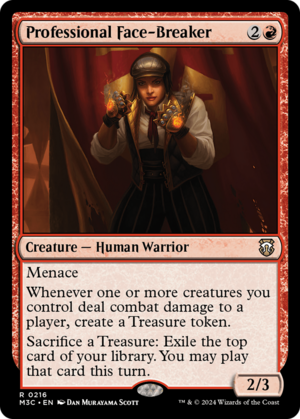
Card Details
Info
| Color: | |
| Identifies: | |
| Cost: |
|
| Rarity: | Rare |
| Converted Cost: | 3 |
| Power/Toughness: | 2/3 |
| Types: | |
| SubTypes: | |
| Languages: | 
      |
| Layout: | Normal |
| Rank: | |
| Saltiness: | |
| Tokens: |
Abilities/Keywords
Rules
Prices
Legalities
Standard
Standardbrawl
Vintage
Modern
Brawl
Historic
Duel
Alchemy
Predh
Oathbreaker
Commander
Pioneer
Oldschool
Timeless
Premodern
Penny
Pauper
Gladiator
Paupercommander
Future
Legacy
Text
Menace Whenever one or more creatures you control deal combat damage to a player, create a Treasure token. Sacrifice a Treasure: Exile the top card of your library. You may play that card this turn.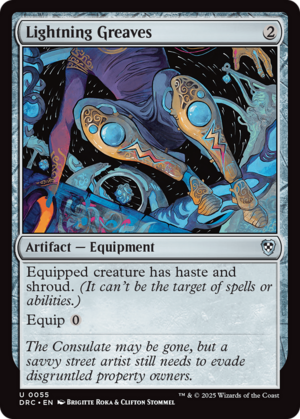
Card Details
Info
| Color: | |
| Identifies: | |
| Cost: |
|
| Rarity: | Uncommon |
| Converted Cost: | 2 |
| Power/Toughness: | / |
| Types: | |
| SubTypes: | |
| Languages: | 
         |
| Layout: | Normal |
| Rank: | |
| Saltiness: |
Abilities/Keywords
Rules
Text
Equipped creature has haste and shroud. (It can't be the target of spells or abilities.) Equip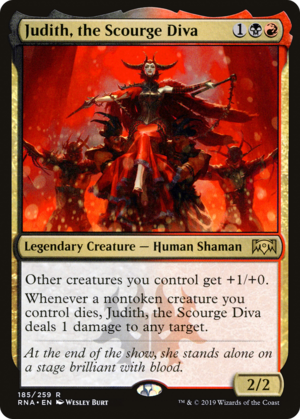
Card Details
Info
| Color: | |
| Identifies: | |
| Cost: |
|
| Rarity: | Rare |
| Converted Cost: | 3 |
| Power/Toughness: | 2/2 |
| Types: | |
| SubTypes: | |
| Languages: | 
          |
| Layout: | Normal |
| Rank: | |
| Saltiness: |
Rules
Prices
Legalities
Standard
Standardbrawl
Vintage
Modern
Brawl
Historic
Duel
Alchemy
Predh
Oathbreaker
Commander
Pioneer
Oldschool
Timeless
Premodern
Penny
Pauper
Gladiator
Paupercommander
Future
Legacy
Text
Other creatures you control get +1/+0. Whenever a nontoken creature you control dies, Judith deals 1 damage to any target.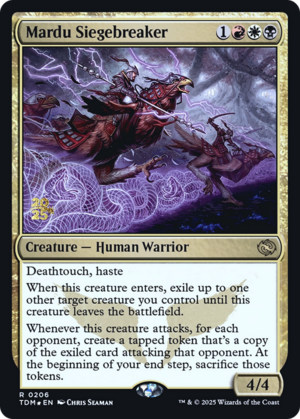
Card Details
Info
| Color: | |
| Identifies: | |
| Cost: |
|
| Rarity: | Rare |
| Converted Cost: | 4 |
| Power/Toughness: | 4/4 |
| Types: | |
| SubTypes: | |
| Languages: | 
     |
| Layout: | Normal |
| Rank: | |
| Saltiness: | |
| Tokens: |
Abilities/Keywords
Rules
Text
Deathtouch, haste When this creature enters, exile up to one other target creature you control until this creature leaves the battlefield. Whenever this creature attacks, for each opponent, create a tapped token that's a copy of the exiled card attacking that opponent. At the beginning of your next end step,sacrificethose tokens.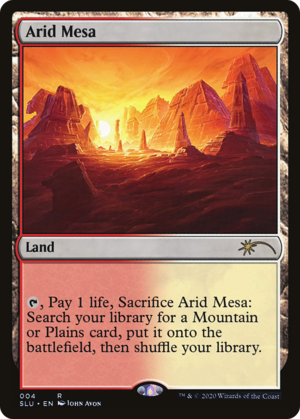
Card Details
Info
| Color: | |
| Identifies: | |
| Cost: | |
| Rarity: | Rare |
| Converted Cost: | 0 |
| Power/Toughness: | / |
| Types: | |
| SubTypes: | |
| Languages: | 
          |
| Layout: | Normal |
| Rank: | |
| Saltiness: |
Rules
Text
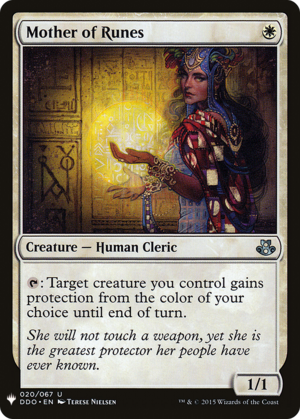
Card Details
Info
| Color: | |
| Identifies: | |
| Cost: |
|
| Rarity: | Uncommon |
| Converted Cost: | 1 |
| Power/Toughness: | 1/1 |
| Types: | |
| SubTypes: | |
| Languages: | 
         |
| Layout: | Normal |
| Rank: | |
| Saltiness: |
Rules
Text
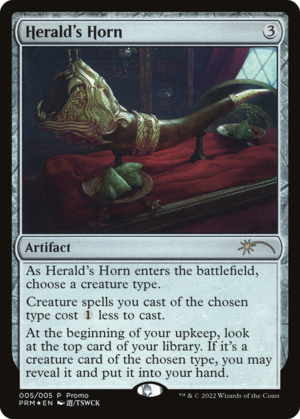
Card Details
Info
| Color: | |
| Identifies: | |
| Cost: |
|
| Rarity: | Rare |
| Converted Cost: | 3 |
| Power/Toughness: | / |
| Types: | |
| SubTypes: | |
| Languages: | 
         |
| Layout: | Normal |
| Rank: | |
| Saltiness: |
Rules
Text
As this artifact enters, choose a creature type. Creature spells you cast of the chosen type cost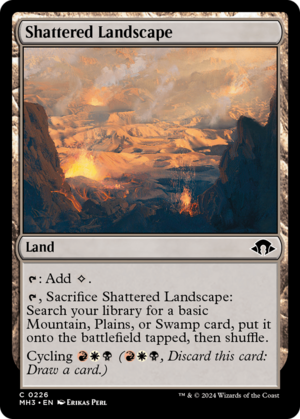
Card Details
Info
| Color: | |
| Identifies: | |
| Cost: | |
| Rarity: | Common |
| Converted Cost: | 0 |
| Power/Toughness: | / |
| Types: | |
| SubTypes: | |
| Languages: | 
       |
| Layout: | Normal |
| Rank: | |
| Saltiness: |
Abilities/Keywords
Rules
Prices
Legalities
Standard
Standardbrawl
Vintage
Modern
Brawl
Historic
Duel
Alchemy
Predh
Oathbreaker
Commander
Pioneer
Oldschool
Timeless
Premodern
Penny
Pauper
Gladiator
Paupercommander
Future
Legacy
Text
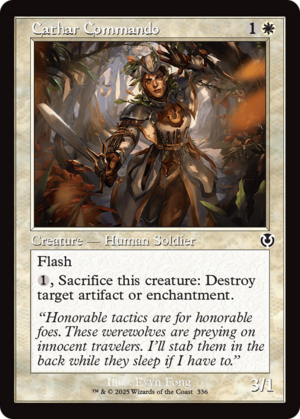
Card Details
Info
| Color: | |
| Identifies: | |
| Cost: |
|
| Rarity: | Common |
| Converted Cost: | 2 |
| Power/Toughness: | 3/1 |
| Types: | |
| SubTypes: | |
| Languages: | 
          |
| Layout: | Normal |
| Rank: | |
| Saltiness: |
Abilities/Keywords
Rules
Prices
Legalities
Standard
Standardbrawl
Vintage
Modern
Brawl
Historic
Duel
Alchemy
Predh
Oathbreaker
Commander
Pioneer
Oldschool
Timeless
Premodern
Penny
Pauper
Gladiator
Paupercommander
Future
Legacy
Text
Flash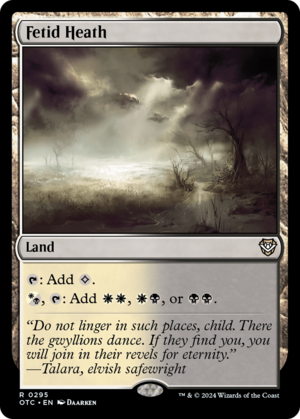
Card Details
Info
| Color: | |
| Identifies: | |
| Cost: | |
| Rarity: | Rare |
| Converted Cost: | 0 |
| Power/Toughness: | / |
| Types: | |
| SubTypes: | |
| Languages: | 
         |
| Layout: | Normal |
| Rank: | |
| Saltiness: |
Rules
Text
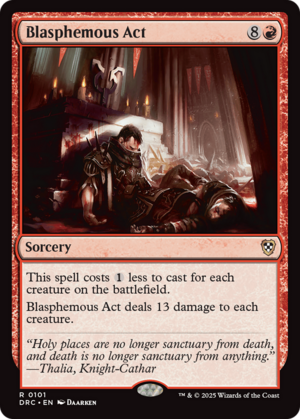
Card Details
Info
| Color: | |
| Identifies: | |
| Cost: |
|
| Rarity: | Rare |
| Converted Cost: | 9 |
| Power/Toughness: | / |
| Types: | |
| SubTypes: | |
| Languages: | 
          |
| Layout: | Normal |
| Rank: | |
| Saltiness: |
Rules
Text
This spell costs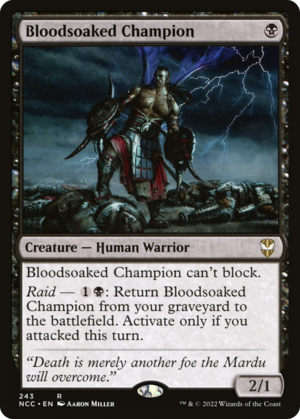
Card Details
Info
| Color: | |
| Identifies: | |
| Cost: |
|
| Rarity: | Rare |
| Converted Cost: | 1 |
| Power/Toughness: | 2/1 |
| Types: | |
| SubTypes: | |
| Languages: | 
          |
| Layout: | Normal |
| Rank: | |
| Saltiness: |
Abilities/Keywords
Rules
Text
This creature can't block. Raid —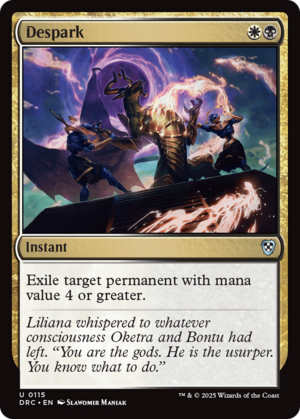
Card Details
Info
| Color: | |
| Identifies: | |
| Cost: |
|
| Rarity: | Uncommon |
| Converted Cost: | 2 |
| Power/Toughness: | / |
| Types: | |
| SubTypes: | |
| Languages: | 
          |
| Layout: | Normal |
| Rank: | |
| Saltiness: |
Rules
Text
Exile target permanent with mana value 4 or greater.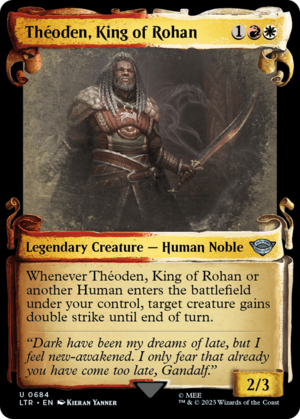
Card Details
Info
| Color: | |
| Identifies: | |
| Cost: |
|
| Rarity: | Uncommon |
| Converted Cost: | 3 |
| Power/Toughness: | 2/3 |
| Types: | |
| SubTypes: | |
| Languages: | 
       |
| Layout: | Normal |
| Rank: | |
| Saltiness: |
Rules
Prices
Legalities
Standard
Standardbrawl
Vintage
Modern
Brawl
Historic
Duel
Alchemy
Predh
Oathbreaker
Commander
Pioneer
Oldschool
Timeless
Premodern
Penny
Pauper
Gladiator
Paupercommander
Future
Legacy
Text
Whenever Théoden or another Human you control enters, target creature gains double strike until end of turn.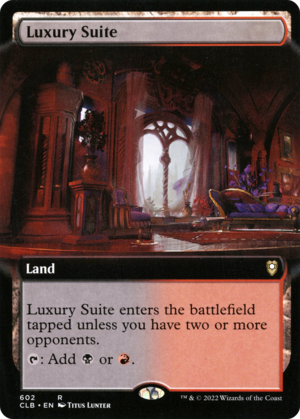
Card Details
Info
| Color: | |
| Identifies: | |
| Cost: | |
| Rarity: | Rare |
| Converted Cost: | 0 |
| Power/Toughness: | / |
| Types: | |
| SubTypes: | |
| Languages: | 
          |
| Layout: | Normal |
| Rank: | |
| Saltiness: |
Rules
Prices
Legalities
Standard
Standardbrawl
Vintage
Modern
Brawl
Historic
Duel
Alchemy
Predh
Oathbreaker
Commander
Pioneer
Oldschool
Timeless
Premodern
Penny
Pauper
Gladiator
Paupercommander
Future
Legacy
Text
This land enters tapped unless you have two or more opponents.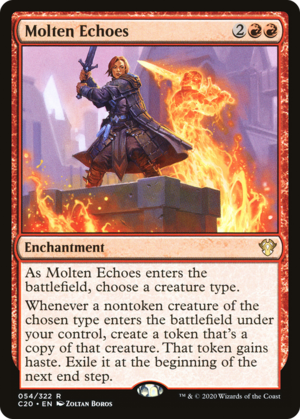
Card Details
Info
| Color: | |
| Identifies: | |
| Cost: |
|
| Rarity: | Rare |
| Converted Cost: | 4 |
| Power/Toughness: | / |
| Types: | |
| SubTypes: | |
| Languages: | 
         |
| Layout: | Normal |
| Rank: | |
| Saltiness: | |
| Tokens: |
Rules
Prices
Legalities
Standard
Standardbrawl
Vintage
Modern
Brawl
Historic
Duel
Alchemy
Predh
Oathbreaker
Commander
Pioneer
Oldschool
Timeless
Premodern
Penny
Pauper
Gladiator
Paupercommander
Future
Legacy
Text
As this enchantment enters, choose a creature type. Whenever a nontoken creature you control of the chosen type enters, create a token that's a copy of that creature. That token gains haste. Exile it at the beginning of the next end step.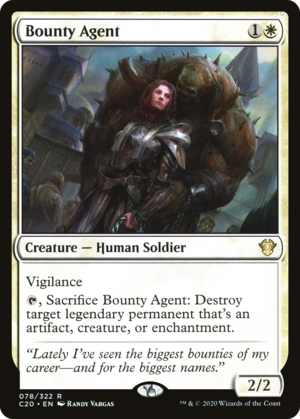
Card Details
Info
| Color: | |
| Identifies: | |
| Cost: |
|
| Rarity: | Rare |
| Converted Cost: | 2 |
| Power/Toughness: | 2/2 |
| Types: | |
| SubTypes: | |
| Languages: | 
          |
| Layout: | Normal |
| Rank: | |
| Saltiness: |
Abilities/Keywords
Rules
Text
Vigilance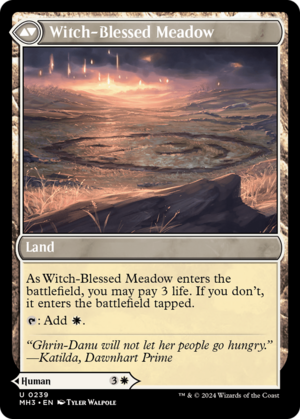
Card Details
- Card Faces:
- Witch Enchanter (Front)
- Witch-Blessed Meadow (Back)
Info
| Color: | |
| Identifies: | |
| Cost: |
|
| Rarity: | Uncommon |
| Converted Cost: | 4 |
| Power/Toughness: | 2/2 |
| Types: | |
| SubTypes: | |
| Languages: | 
       |
| Layout: | Modal Dfc |
| Rank: | |
| Saltiness: |
Rules
Prices
Legalities
Standard
Standardbrawl
Vintage
Modern
Brawl
Historic
Duel
Alchemy
Predh
Oathbreaker
Commander
Pioneer
Oldschool
Timeless
Premodern
Penny
Pauper
Gladiator
Paupercommander
Future
Legacy
Text
When this creature enters,destroytarget artifact or enchantment an opponent controls.Info
| Color: | |
| Identifies: | |
| Cost: | |
| Rarity: | Uncommon |
| Converted Cost: | 0 |
| Power/Toughness: | / |
| Types: | |
| SubTypes: | |
| Languages: | 
       |
| Layout: | Modal Dfc |
| Rank: | |
| Saltiness: |
Rules
Prices
Legalities
Standard
Standardbrawl
Vintage
Modern
Brawl
Historic
Duel
Alchemy
Predh
Oathbreaker
Commander
Pioneer
Oldschool
Timeless
Premodern
Penny
Pauper
Gladiator
Paupercommander
Future
Legacy
Text
As this land enters, you may pay 3 life. If you don't, it enters tapped.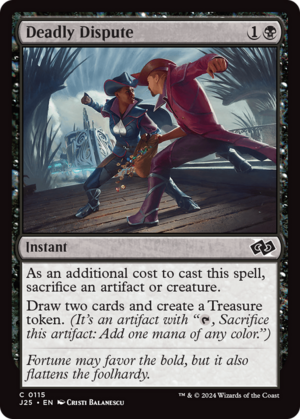
Card Details
Info
| Color: | |
| Identifies: | |
| Cost: |
|
| Rarity: | Common |
| Converted Cost: | 2 |
| Power/Toughness: | / |
| Types: | |
| SubTypes: | |
| Languages: | 
          |
| Layout: | Normal |
| Rank: | |
| Saltiness: | |
| Tokens: |
Abilities/Keywords
Rules
Text
As an additional cost to cast this spell,sacrificean artifact or creature. Draw two cards and create a Treasure token. (It's an artifact with "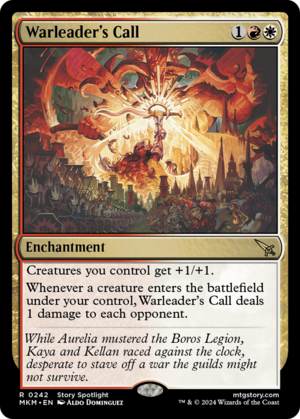
Card Details
Info
| Color: | |
| Identifies: | |
| Cost: |
|
| Rarity: | Rare |
| Converted Cost: | 3 |
| Power/Toughness: | / |
| Types: | |
| SubTypes: | |
| Languages: | 
       |
| Layout: | Normal |
| Rank: | |
| Saltiness: |
Rules
Prices
Legalities
Standard
Standardbrawl
Vintage
Modern
Brawl
Historic
Duel
Alchemy
Predh
Oathbreaker
Commander
Pioneer
Oldschool
Timeless
Premodern
Penny
Pauper
Gladiator
Paupercommander
Future
Legacy
Text
Creatures you control get +1/+1. Whenever a creature you control enters, this enchantment deals 1 damage to each opponent.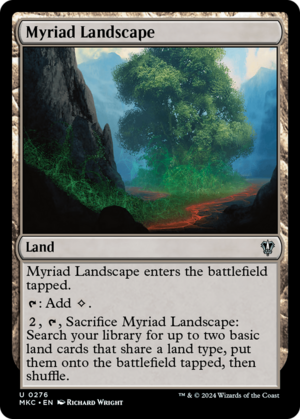
Card Details
Info
| Color: | |
| Identifies: | |
| Cost: | |
| Rarity: | Uncommon |
| Converted Cost: | 0 |
| Power/Toughness: | / |
| Types: | |
| SubTypes: | |
| Languages: | 
         |
| Layout: | Normal |
| Rank: | |
| Saltiness: |
Rules
Prices
Legalities
Standard
Standardbrawl
Vintage
Modern
Brawl
Historic
Duel
Alchemy
Predh
Oathbreaker
Commander
Pioneer
Oldschool
Timeless
Premodern
Penny
Pauper
Gladiator
Paupercommander
Future
Legacy
Text
This land enters tapped.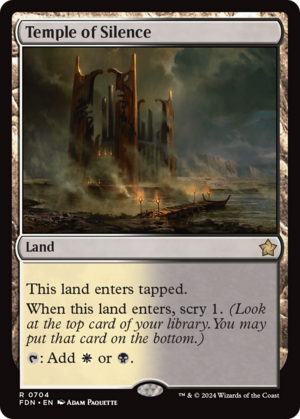
Card Details
Info
| Color: | |
| Identifies: | |
| Cost: | |
| Rarity: | Rare |
| Converted Cost: | 0 |
| Power/Toughness: | / |
| Types: | |
| SubTypes: | |
| Languages: | 
          |
| Layout: | Normal |
| Rank: | |
| Saltiness: |
Abilities/Keywords
Rules
Text
This land enters tapped. When this land enters, scry 1. (Look at the top card of your library. You may put that card on the bottom.)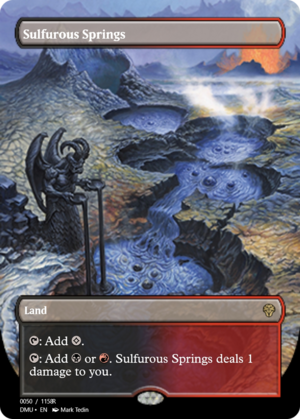
Card Details
Info
| Color: | |
| Identifies: | |
| Cost: | |
| Rarity: | Rare |
| Converted Cost: | 0 |
| Power/Toughness: | / |
| Types: | |
| SubTypes: | |
| Languages: | 
        |
| Layout: | Normal |
| Rank: | |
| Saltiness: |
Rules
Prices
| Seller | Price |
|---|
Legalities
Standard
Standardbrawl
Vintage
Modern
Brawl
Historic
Duel
Alchemy
Predh
Oathbreaker
Commander
Pioneer
Oldschool
Timeless
Premodern
Penny
Pauper
Gladiator
Paupercommander
Future
Legacy
Text
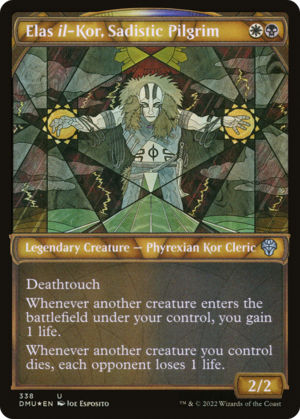
Card Details
Info
| Color: | |
| Identifies: | |
| Cost: |
|
| Rarity: | Uncommon |
| Converted Cost: | 2 |
| Power/Toughness: | 2/2 |
| Types: | |
| SubTypes: | |
| Languages: | 
       |
| Layout: | Normal |
| Rank: | |
| Saltiness: |
Abilities/Keywords
Rules
Prices
Legalities
Standard
Standardbrawl
Vintage
Modern
Brawl
Historic
Duel
Alchemy
Predh
Oathbreaker
Commander
Pioneer
Oldschool
Timeless
Premodern
Penny
Pauper
Gladiator
Paupercommander
Future
Legacy
Text
Deathtouch Whenever another creature you control enters, you gain 1 life. Whenever another creature you control dies, each opponent loses 1 life.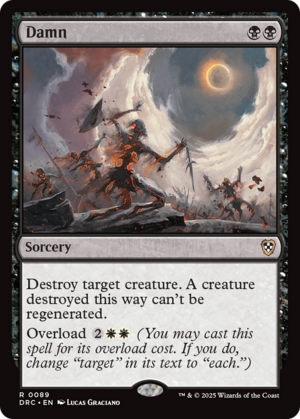
Card Details
Info
| Color: | |
| Identifies: | |
| Cost: |
|
| Rarity: | Rare |
| Converted Cost: | 2 |
| Power/Toughness: | / |
| Types: | |
| SubTypes: | |
| Languages: | 
          |
| Layout: | Normal |
| Rank: | |
| Saltiness: |
Abilities/Keywords
Rules
Text
Destroy target creature. A creature destroyed this way can't be regenerated. Overload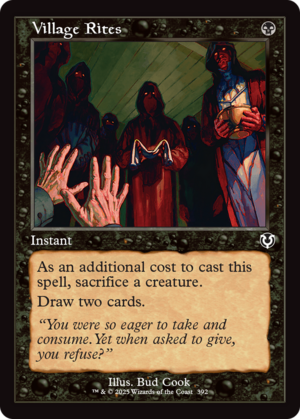
Card Details
Info
| Color: | |
| Identifies: | |
| Cost: |
|
| Rarity: | Common |
| Converted Cost: | 1 |
| Power/Toughness: | / |
| Types: | |
| SubTypes: | |
| Languages: | 
          |
| Layout: | Normal |
| Rank: | |
| Saltiness: |
Rules
Prices
Legalities
Standard
Standardbrawl
Vintage
Modern
Brawl
Historic
Duel
Alchemy
Predh
Oathbreaker
Commander
Pioneer
Oldschool
Timeless
Premodern
Penny
Pauper
Gladiator
Paupercommander
Future
Legacy
Text
As an additional cost to cast this spell,sacrificea creature. Draw two cards.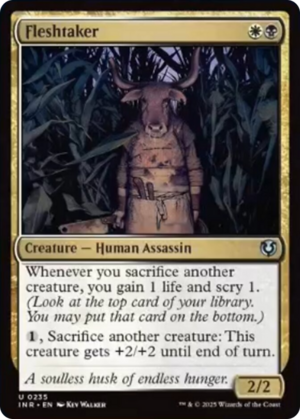
Card Details
Info
| Color: | |
| Identifies: | |
| Cost: |
|
| Rarity: | Uncommon |
| Converted Cost: | 2 |
| Power/Toughness: | 2/2 |
| Types: | |
| SubTypes: | |
| Languages: | 
         |
| Layout: | Normal |
| Rank: | |
| Saltiness: |
Abilities/Keywords
Rules
Prices
Legalities
Standard
Standardbrawl
Vintage
Modern
Brawl
Historic
Duel
Alchemy
Predh
Oathbreaker
Commander
Pioneer
Oldschool
Timeless
Premodern
Penny
Pauper
Gladiator
Paupercommander
Future
Legacy